




Qatar has established a goal of augmenting its annual liquefied natural gas (LNG) production from 77m tonnes per annum (mtpa) to 126 mtpa by the year 2027. The North Field Expansion project, comprising North Field East (NFE) and North Field South (NFS), is a significant endeavour aimed at enhancing Qatar’s liquefied natural gas (LNG) production capacity. The project is divided into two distinct phases, with phase 1 currently underway, targeting a production capacity of 110m tonnes per annum by 2025. Phase 2, set to be completed by 2027, will further increase the capacity to an impressive 126 mtpa.
The North Field Expansion project involves the construction of new liquefaction trains and offshore facilities, essential components for efficiently transforming natural gas into LNG. To execute this ambitious initiative, a joint venture has been formed between QatarEnergy and renowned energy companies TotalEnergies, ExxonMobil, ConocoPhillips, Eni and Shell. The primary objectives of this expansion project are to bolster Qatar’s LNG production capabilities, stimulate its economy and solidify its position as the foremost LNG exporter globally. By significantly increasing LNG output, Qatar aims to capitalise on the rising demand for natural gas and establish itself as a pivotal player in the international energy market. Through the implementation of the North Field Expansion project, Qatar is poised to secure long-term economic benefits, enhance its energy infrastructure and sustain its position as a key supplier of LNG to the world.
In June 2022, QatarEnergy and China Petroleum & Chemical Corporation (Sinopec) inked a 27-year sale and purchase agreement (SPA) for the provision of 4m tonnes per annum of liquefied natural gas to China. The contracted LNG volumes will be sourced from QatarEnergy’s North Filed East LNG expansion project and transported to Sinopec’s receiving terminals in China, in accordance with the terms specified in the SPA. Moreover, in November 2022, QatarEnergy and ConocoPhillips affiliates signed two long-term LNG sale and purchase agreements for the delivery of up to 2m tonnes per annum of LNG from Qatar to Germany. The delivery of the LNG is expected to commence in 2026. The LNG volumes will come from QatarEnergy and ConocoPhillips joint ventures that have stakes in Qatar’s North Field East and North Field South projects. Most recently, in June 2023, QatarEnergy concluded a 15-year supply deal for liquefied natural gas with PetroBangla, the state-owned entity of Bangladesh. Under this agreement, 1.8m tonnes of LNG will be supplied annually, commencing in 2026.
These strategic agreements demonstrate QatarEnergy’s expanding presence in the global LNG market and its commitment to establishing enduring partnerships with significant energy stakeholders. By harnessing Qatar’s substantial LNG reserves and infrastructure, these agreements contribute to the sustainable supply of LNG while fostering robust trade relationships between Qatar and prominent importers such as China, Germany and Bangladesh. QatarEnergy has demonstrated its commitment to developing major energy projects by taking the final investment decision (FID) for the North Field East project in 2021. This significant milestone was announced alongside the award of the EPC contract for Package 1. Signed by Chiyoda Corporation and Technip Energies, the contract marks a crucial step in the development of the NFE project. The main scope of the EPC contract is the construction of four mega LNG trains with a capacity of 8m tonnes per annum each. These facilities will be located within Ras Laffan Industrial City. Building on this success, QatarEnergy has recently awarded a significant engineering, procurement and construction (EPC) contract worth US$10bn to a joint venture of Technip Energies and Consolidated Contractors Company (CCC) for the North Field South project. The project involves constructing two LNG mega trains, each with a capacity of 8 mtpa.
Qatargas undertook the development of the North Field Production Sustainability (NFPS) compression project. This significant endeavour is closely linked to the ongoing North Field Expansion project and aims to enhance regional production sustainability and efficiency. The NFPS compression project encompasses the construction and installation of multiple offshore compression platforms, along with associated flare towers and living quarter platforms. These platforms, estimated to weigh between 20,000 to 40,000 tonnes each, will be strategically positioned in the North Field to optimise production operations.
These critical elements are essential for the overall success and seamless integration of the NFPS compression project. By implementing advanced compression technology, Qatargas aims to maximise the utilisation of the North Field’s vast natural gas resources while ensuring sustainable production practices. The project’s comprehensive scope demonstrates Qatargas’ commitment to innovation, environmental stewardship and the region’s long-term economic viability. The NFPS compression project is a testament to Qatargas’ expertise in the energy sector and its dedication to meeting the growing global demand for natural gas.
Faiz Halim Energy Analyst – All Sectors (Middle East & North Africa) faiz.halim@the-eic.com

The celebrations of the EIC’s 80th anniversary continue with the forthcoming Walkathon. This will start overnight on 15 August in London and continue until 80km are covered. This is not only a fantastic opportunity for our staff and member companies to come together as a team but also to help a cause that is close to our hearts – supporting the National Trust in planting 20m trees across the UK by 2030. Any charitable donations towards this worthy objective, large or small, can be made through the EIC’s Just Giving page www.justgiving.com/page/eic80for80?utm_term=3zJdkwa4v
The seventh edition of the EIC Survive & Thrive Insight Report has been published. We interviewed 96 member companies for the report this year, our biggest yet, 50% up on last year. You’ll find the stories featured at the end of each Inside Energy issue. To read the full report visit www.the-eic.com/MediaCentre/Publications/SurviveandThrive
This edition’s sector analysis has been produced by Faiz Halim, EIC’s energy analyst for the Middle East & North Africa. The article dives into the efforts by the Qatar government to expand and fortify the country’s gas sector. Qatar intends to augment its annual liquefied natural gas (LNG) output from 77m tonnes per year to 126m by 2027.
As a guest editorial, we welcome Ian Griffiths, CEO of EIC member company Steel Dynamics Group. Among other things, Ian discloses Steel Dynamics’ work, the role of stainless-steel providers in the energy transition and how the company has been preparing for it while investing in sustainability.

Don’t forget to check the member’s news and spotlight on technology pages, where you’ll discover the offerings and developments of Actavo and Harting.
Last but not least, readers can keep up with the latest trends of the international energy industry with regional comments from our directors in Europe, the Americas, Asia Pacific and the MENA region, as well as news from our global members.
Léliam de Castro, Head of Marketing and Communications leliam.castro@the-eic.com


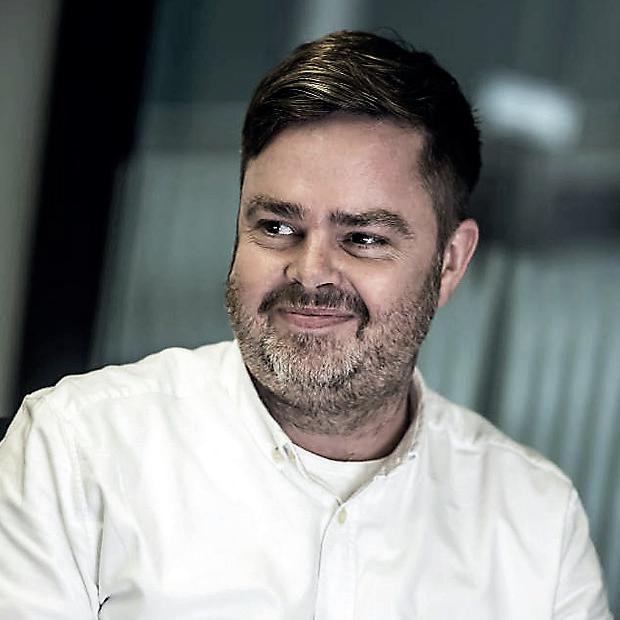
Why did you become an EIC member?
What has your experience been so far?
As we are a project led organisation, we initially joined EIC for the EICDataStream project tracking database, this contains information on energy projects from inception through to completion. This proved to be incredibly useful and something that we still use today. We have been members for three years and as time has progressed we have gained more and more from our membership including participating in a round table around the journey to net zero, developing valuable relationships with other EIC members, being shortlisted in the EIC’s national awards and latterly judging them.
What are the synergies between Applica and the EIC?
We have found that the EIC has an incredible knowledge and intelligence of the energy market and has a complete focus on this sector, just like Applica. This level of understanding enables the EIC and Applica to add real value to the needs of clients.
Where would you like to see Applica and the EIC in the next 80 years?
Building and maintaining strong, high quality relationships and understanding that the industry and technology is central to what we do.
I would like to see Applica and the EIC remain focused on these areas with a dedication to embracing the technology to reach net zero.
About Applica

Applica resources projects globally for companies integral to energy transition.
The team at Applica is people-centric, diligent, agile and innovative. Great people who strive for excellence are essential to what the company does. Consistent, high-quality training is central to its culture.
Applica’s head office, based in Manchester, acts as its global recruitment hub. It has businesses registered in both Houston and Stavanger to support the energy markets of North America and Scandinavia and has solutions in place to support Europe and Asia.
Applica prides itself on developing long-term relationships with clients and contractors. This approach combined with in depth technical knowledge of the energy industry ensures that Applica always provides a holistic solution.
Why did you become an EIC member?

What has your experience been so far?
Being a SME organisation, the help and support that membership bodies such as EIC provide is extremely valuable. EIC has assisted asset55 in growing our presence in the industry, increasing brand awareness and helping share our growth as an independent company. Although we have only been a member with EIC for less than a year, our experience with EIC has been fantastic. From regular one-to-ones, to assistance in exhibitions and conferences, press releases, social media, EICDataStream, promotion of news and thought leadership pieces – EIC goes out of its way to assist asset55 in any way it can.
The quality of what EIC has to offer is also highly regarded by asset55. With regards to events, whether it be its own regional events or pavilions at the grander international events – EIC offers a range of great options that contribute to our overall goals in regards to the event. Its publications and reports are also top quality, offering insight into the other members’ news and keeping the industry up-to-date.
What are the synergies between asset55 and the EIC?
As previously mentioned, asset55 is an SME organisation and the synergy lies in EIC’s ability to promote awareness of asset55 in the industry while assisting other industry members to discover beneficial opportunities with us and what we have to offer.
EIC has given us a platform to assist in telling our story, an example being its Survive and Thrive report, where it has allowed us to tell our story to a wider audience in the industry with the possibility of an award – giving recognition to the wonderful team at asset55.
Where would you like to see asset55 and the EIC in the next 80 years?
In 80 years, I would like to see the asset55 team grow in size, with the ability to offer more and more software based off the expertise and experience of industry engineers and our in-house software developers – to help improve efficiency, productivity and safety in the industry.

With regards to EIC, in 80 years, I hope to see its membership grow along with its diverse range of opportunities available to assist its members in marketing based activities, brand awareness, business development and sales.
About asset55
At its core, asset55 is a software engineering technology company, bringing together highly experienced industry engineers combined with leading software developers to drive real and positive change within the energy sector. Aligned across two divisions, Operations and Projects, asset55 enables change through a portfolio of execution specific software, which share two common traits – improving safety and improving productivity to its clients.
Established in 2012, asset55 has grown organically to become a leading and trusted provider of SaaS technology to the energy sector while maintaining clear objectives to support its customers on critical operations to ensure that it goes above and beyond expectations on delivery and execution of its services.
Why did you become an EIC member?
What has your experience been so far?
I was honoured to be invited to join the EIC and more than happy to accept the invitation. I accepted the invitation because of EIC’s strong reputation in the industry, the high-quality pedigree of the other members and the opportunity to network with industry peers. My experience has been great thus far and has exceeded my expectations. I really appreciate the level of guest speakers at the quarterly meetings and the insightful ideas and market conditions that are discussed.
What are the synergies between McDermott and the EIC?

I think the synergies and mutual benefits are strong. As a top-tier EPC company, I like to believe that McDermott can offer our own insights on market conditions and the state of the industry. I also feel like that as a client to many of the vendors that are EIC members, that gives fellow EIC members an opportunity to network with McDermott supply chain management personnel, to demonstrate value and explain their unique capabilities. In return, EIC provides McDermott insightful views on industry trends and facilitates relationship building with potential McDermott clients.
Where would you like to see McDermott and the EIC in the next 80 years?
I suppose I’d like to see both McDermott and EIC at the forefront of the industry, still leading the way, having made a successful transition into whatever is coming next in the energy industry.
McDermott is a premier, fully-integrated provider of engineering and construction solutions to the energy industry. Its customers trust its technology-driven approach engineered to responsibly harness and transform global energy resources into the products the world needs.
From concept to commissioning, McDermott’s innovative expertise and capabilities advance the next generation of global energy infrastructure –empowering a brighter, more sustainable future for us all. Operating in over 54 countries, McDermott’s locally-focused and globally-integrated resources include more than 30,000 employees, a diversified fleet of specialty marine construction vessels and fabrication facilities around the world.

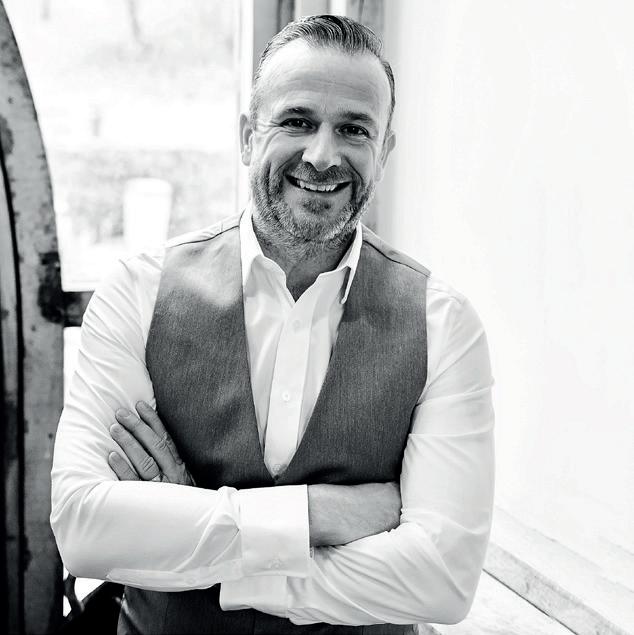
How has the EIC helped you through the years? Any interesting stories to tell?
Initially the EIC helped us to prioritise certain sales focuses by utilising the projects database, by researching certain CAPEX s, allowing us to understand the market opportunities for us as a company, which companies to focus on and in which markets.
We then started to attend EIC organised networking events, both nationally and internationally, which gave us valuable insights as to what our peers are doing and working on in the various focus industries we are following. Then the natural progression was for us to be more involved in the international expo events. With the EIC offering support to take part from the organisational to stand design, it allowed us as a company to focus on the sales element at such events and lead creation and progression.
The EIC has evolved into an organisation that supports the growth or our international business and we are really grateful to have been associated for over two decades.
What are the synergies between Weidmüller and the EIC?
International and national presence, in key markets, striving to support industries in the growth of energy transition.
Where would you like to see Weidmüller and the EIC in the next 80 years?
Great question. I would like to see Weidmüller and the EIC continuing to be leading industry peers to the energy transition markets. We both have different but important roles, with Weidmüller offering its unique engineering expertise to create solutions that positively impact the market trends, and the EIC continuing to support companies like Weidmüller, with expert guidance, market intelligence and networking platforms to grow our global presence.
About WeidmüllerIn today’s process industry, plant availability, modularisation and digitalisation are among the most important factors for being competitive in the international market. Klippon Engineering is the internationally renowned partner of the Weidmüller Group in the field of process engineering. It combines over 60 years of engineering expertise with the knowledge and experience of its specialists and strategic partnerships in the process industry.
The company’s globally operating network focuses on the development and supply of products, solutions and systems that extend the service life of your plants, increase your production efficiency, reduce investment costs and enhance safety – always in accordance with the latest internationally recognised certifications and standards.

Operator: EDF
Value: US$18.75bn
The EDF Group has filed requests for authorisations to build its first pair of 1650MW EPR2 reactors at the Penly Nuclear Power Plant. EDF is planning a total of three pairs of EPR2 reactors, the first at Penly, the second at Gravelines and the third at either Bugey or Tricastin.
Operator: Hynfra PSA
Value: US$2bn
Hynfra PSA and Fidelity Group have partnered to build a green ammonia plant in Jordan. The plant, located in the Aqaba Special Economic Zone, aims to produce up to 200,000 tonnes of green ammonia annually.
Operator: LOKEN Sdn Bhd
Value: US$100m
Toyo Engineering & Construction has been awarded a pre-FEED contract for the proposed SAF plant which would be the first in Malaysia. The pre-FEED study will determine the project’s commercials and ensure it is aligned with the intended plant capacity.
Operator: Woodside
Value: US$7.2bn
A final investment decision has been reached on the project. Hyundai Heavy Industries has been awarded the EPC contract for the FPU vessel which is planned for delivery in April 2027. Cosco Shipping Heavy Industry has been awarded a FEED contract by SBM Offshore for the FSO.
Operator: Xlinks
Value: US$5bn
Between 14 July and 14 September 2023, a geophysical survey will be conducted in UK waters. The survey is being conducted by GEOxyz using the vessel Geo Ocean VI. Research suggests that Xlinks will secure financing for the development in 2025.

Operator: Corio Generation
Value: US$1.5bn
DORIS has been awarded the frontend engineering design (FEED) contract for the project’s electrical and communications system to grid connection, array and export cabling and all components of the fixed offshore substation foundation and topsides structures.
For more information on these and the 13,500 other current and future projects we are tracking please visit EICDataStream
EICSupplyMap maps the capabilities of supply chain companies that operate in the wider energy industry. These industries cover renewables, upstream, midstream, downstream, power, nuclear, energy storage and the potential and proven capabilities in carbon capture and hydrogen. After successfully mapping the UK market, EICSupplyMap now covers the United Arab Emirates, Malaysia, Texas/US and Brazil.
• Identify the supply chain local to your region, giving you the opportunity to engage with potential new clients.
• Find the supply chain capability in five regions, now covering the UK, UAE, Malaysia, Texas/US and Brazil.

• An in-depth look at profiles of more than 6,000 energy sector supply chain companies.
• Make smarter decisions by targeting your offering to international developers/operators and contractors matching your capability with international energy projects.
www.actavo.com/industrial/

Company wins special Fleet Technology Trophy for second year running.
Actavo has secured four prestigious, internationally recognised awards in acknowledgement of its work in health and safety, at the annual Health and Safety Awards organised by the Royal Society for the Prevention of Accidents (RoSPA) in the UK.

Three of the RoSPA awards recognise Actavo for its longterm achievements in health and safety, including its road safety strategy across its industrial, PDC and network and in-home divisions.

Actavo Industrial Solutions UK has been awarded the RoSPA Order of Distinction Award following 19 consecutive years of achieving Gold awards.
Actavo Network & In-Home achieved three awards including: the RoSPA President’s Award, which recognises the company’s achievement of winning the Gold Award for 12 consecutive years; the RoSPA Fleet Safety Gold Medal, in recognition of seven consecutive years of Gold Awards; and the RoSPA Fleet Safety Technology Trophy, which recognises Actavo’s road safety strategy and excellence in managing occupational road risk. This is an industry specific award, which Actavo has now been awarded for the second year running.
Organisations receiving a RoSPA award are recognised as being world-leaders in health and safety practice. Every year, nearly 2,000 entrants vie to achieve the highest possible accolade in what is the UK’s longest-running H&S industry awards.
The annual awards are categorised by different levels of achievement: Merit, Bronze, Silver and Gold, as well as long-term awards that recognise companies for achieving Gold awards for multiple consecutive years.
Actavo is honoured to have once again received this recognition from the Royal Society for the Prevention of Accidents. RoSPA awards are widely recognised as being among the foremost international accolades in the health and safety sector. Safety is our number one company value, and these awards are an acknowledgement of that culture and of our long-term track record of excellence in this area.
Brian Kelly, Group CEO, ActavoAccidents at work and work-related ill health don’t just have huge financial implications or cause major disruption – they significantly impact an individual’s quality of life. That’s why good safety performance deserves to be recognised and rewarded. We are thrilled that Actavo has won these RoSPA awards and would like to congratulate them on showing an unwavering commitment to keeping their employees, clients and customers safe from accidental harm and injury.
Julia Small, Achievements Director, RoSPA
www.harting.com/UK/en-gb
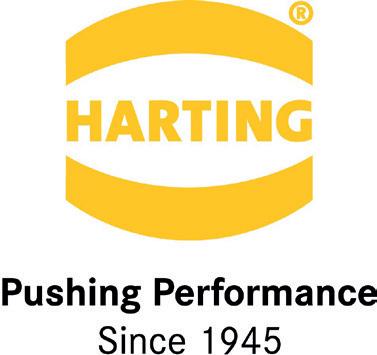
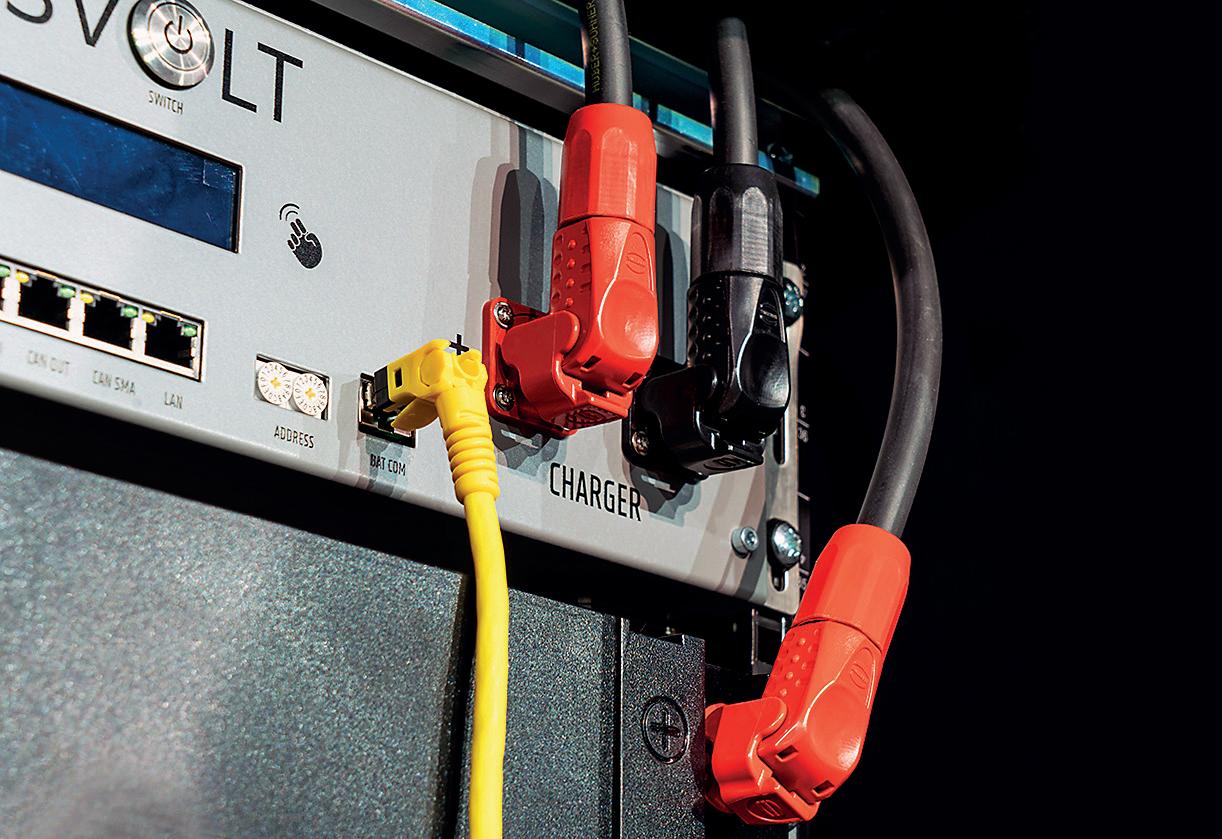
Connectors also speed up the construction of hugely beneficial energy storage modules, which allow companies to maintain an uninterrupted power supply and save on energy costs by using delayed load usage.
As demand continues to increase, storage system providers need to connect several cells. The Han S® is specially designed to meet this need, providing safe connections for the assembly of battery storage modules in large quantities with maximum safety. The design meets all technical requirements and is based on the latest standard UL 4128 for stationary energy storage systems.
Han S® also simplifies servicing and maintenance. If an energy storage module cell shows a drop in performance, the respective management system can switch it off and have it replaced.
To do so, the Han S® interfaces of the adjacent modules are simply turned to the locked state to make room for the switch-out. This procedure can be done without interrupting the energy storage functions of the neighbouring modules.
Han S® is the first high-current battery connector that meets the relevant UL and railway standards for stationary energy storage systems. Among others, it fulfils the requirements of UL 4128 for connectors in electrochemical battery system applications, UL 1973 for batteries in stationary applications and UL 9540 for energy storage systems and accessories. The range is also shock and vibration proof according to the relevant railway standards. To learn more, please visit: www.harting.com/UK/en-gb/connector-battery-storage

23753 Community Street West Hills Los Angeles CA 91304 US
Contact Peter Petyt, CEO
Telephone +1 818 821 4478
Email peter@4rivers.legal
Web www.4rivers.legal
4 Rivers is a third-party funding advisor and brokerage which originates claims either directly from claimants or through law firms.
The company helps to structure claims so that the chances of them securing funding are substantially better than if 4 Rivers was not involved. Its methodology is the result of many years of corporate finance experience where businesses and projects were prepared and presented to funders.
The low acceptance rate of thirdparty funders mirrors that of the venture capital and private equity arenas. An advised proposition may be 20 times more likely to succeed than a non-advised one.

4541 S 700 E, STE 25 Salt Lake City Utah 84107 US
Contact
Shahriyar Majlesein, CEO
Telephone +1 385 265 1707
Email shahriyar.majlesein@cec.ltd
Web www.cec.ltd
Established in 2015, Citadel Engineering Company (CEC), a recognised trademark, has redefined the engineering field, particularly with its innovative global grain trading services. Today, CEC is among the rapidly growing testing, inspection and certification (TIC) organisations in the industry, offering a comprehensive range of services including engineering, inspection, calibration, certification and training. Spanning across four regions, CEC operates five business segments, with operational bases in countries from the UK to the UAE and strategic alliances in China and India. Additionally, CEC has offices in Mozambique and Guyana, as well as a facility in Iraq.
CEC serves as the parent organisation for a host of subsidiaries. Great Citadel, a key partner of Emerson, ABB and Honeywell, is a leading supplier in the Middle East. CECB, another subsidiary, is a certification body accredited by UKAS. Citadel Academy delivers accredited professional training. The newest member of the CEC group is Citadel Scientific Company, which concentrates on renewable and green energy.
Rua Teófilo Otoni 63/11º andar – Centro Rio de Janeiro
RJ, Brazil, 20090-080
Contact Bruno Ghiatã, Sales VP
Telephone +55 21 2240 1300
Email bruno.ghiata@infotecbrasil.com.br
Web www.infotecbrasil.com.br
Infotec Brasil is a company specialising in services, processes and people outsourcing (BPO), with more than 35 years of experience and more than 500 projects delivered.

The company takes care of client’s operational efficiency, combining specialised people, best practices, technology and assets.
Its methodology delivers optimised processes, risks reduction and more competitive costs.
Infotec Brasil’s main cornerstones are ethics, respect for the environment and maximum operational security.

6 Tagore Drive
#04-05
Singapore 787623
Contact Chris Holmes, Business
Development ManagerTelephone +65 9759 7970
Email chris.holmes@ippgrp.com
Web www.ippgrp.com
IPP Scomark is regarded as one of the primary leaders in the supply of piping products. Backed by its Global Group of companies, it is your key contact for all pipes, fittings and flanges.
IPP is one of the largest manufacturers, stockholders and fabricators of all piping products ranging from carbon steel, LTCS, HYCS (with and without cladding), stainless steel, duplex, super duplex, 6% moly and high nickel alloys.
The company specialises in providing the energy industry with proven products that stand up to the most hostile, high pressurehigh temperature conditions; right through to innovative sustainable future developments within nuclear, hydrogen and carbon capture.
IPP Scomark’s strategic global office locations keeps it close to its clients, enabling the company to respond and deliver on very short lead times, regardless of time zone.


Bollin House Riverside Park Wilmslow Cheshire SK9 1DP
Contact Simon Calvert, Business Development Manager
Telephone +44 (0)1625 537 555
Email scalvert@leap29.com
Web www.leap29.com
For over 20 years, Leap29 has been helping businesses advance by providing reliable recruitment and employment management support.
It operates from seven global offices around the world and works with businesses across the engineering sector, including renewable energy, oil and gas, construction, pharmaceuticals, FMCG and IT. Leap29 offers tailored solutions to meet your requirements, whether you are looking to recruit hard to find experts or need compliant PEO employment management support, the company can be your trusted partner, no matter the location.
Level 3A, Menara RKT 36 Jalan Raja Abdullah Off Jalan Sultan Ismail 50300
Kuala Lumpur
Contact Faezah Jeman, General Manager of Corporate Planning & Business Development
Telephone +603 2715 2303
Email faezah.jeman@redtechoffshore.com
Web www.redtechoffshore.com
Redtech Offshore was founded in 2014 with accumulatively more than 30 years of experience providing upstream services and offshore construction.
From planning to execution, Redtech Offshore commits to deliver projects safely, on time and cost-efficiently with its mantra: ‘your partner in value creation, we ensure added value in every project, at all levels of the supply chain.’


THURSDAY 19 OCTOBER 2023


#NAD2023
Hosted by Dame Joanna Lumley

ABB is collaborating with Lhyfe, a pioneer in the production of renewable hydrogen and Skyborn, a global leader in renewable energy, to jointly realise and optimise one of Europe’s most ambitious renewable hydrogen projects, SoutH2Port.
The project is to be located in close proximity to Skyborns’ 1GW offshore wind farm Storgrundet in Söderhamn, Sweden, where Skyborn and Lhyfe recently entered a sales purchase agreement with Stora Enso for an industrial property of around 40 hectares. Fully operational, SoutH2port is expected to produce about 240 tons of hydrogen per day.
As part of the memorandum of understanding signed between the companies, ABB will apply critical expertise to optimise the integration of the hydrogen and electricity production across the entire ecosystem including automation, electrical and digital technologies and drive the development of scalable, commercial energy transition projects in and around the region. The aim is to explore opportunities to tie-in Power-to-X conversion technologies turning renewably sourced electricity into carbon-neutral energy carriers, such as hydrogen, and storing the energy.
The new plant will support the decarbonisation of the Swedish energy system, either directly with hydrogen supply or by further downstream production of refined fuels such as methanol, sustainable aviation fuel or ammonia –contributing to the government’s plans to become the world’s first fossil-free welfare country by 2045.
Amarinth, a world-leading, net-zero designer and manufacturer of low lifecycle cost centrifugal pumps and associated equipment, primarily for the offshore and onshore oil and gas industries; nuclear and renewable energy generation; defence; desalination; process and industrial markets, has signed PE Energy Ltd, based in Nigeria, as a West African agent and approved certified service provider.

Amarinth has developed a strong market presence for its pumps in Africa, spearheaded by its regional manager Ejiro Erivona, based in Nigeria. In this agreement, signed between Chris Ryan, sales director of Amarinth and Daere Akobo, founder and group managing director of PE Energy, during a visit by PE Energy to Amarinth’s head office in Rendlesham, UK, PE Energy will deliver local marketing and sales support to the West African region and become an approved certified service provider following a training programme delivered by Amarinth.
The new partnership will enable oil and gas organisations in the region to benefit from local expertise and skills in both commissioning and maintaining Amarinth API 610 and API 685 horizontal, vertical and in-line pumps and also when replacing or refurbishing obsolete pumps from other OEMs, particularly where the original pump manufacturer has gone out of business. This will further boost in-country value, with oil and gas organisations being able to select high-quality, qualified local suppliers to fulfil these requirements.
In the latest sign of its progressive shift to more sustainable products, Atlas Copco has expanded its portable electric product portfolio to include an all-new battery driven portable screw air compressor. The B-Air 185-12 is the first of its kind within the global industrial marketplace and represents a major milestone in Atlas Copco’s roadmap towards a sustainable future.
The B-Air 185-12 features 5-12 bar of pressure, a stable flow rate of 5.43.7m3/min and 55kWh battery storage capacity. With power delivered from its onboard power pack, in operation a fully charged unit is independent of the need for fuel or a local power source to plug into, and has the capability to perform for up to a full typical work shift. In turn, it provides both portability and productivity for those working on sites where regular access to electricity is not practical. Making the switch from an internal combustion engine (ICE) to electric motor brings with it a host of benefits, including less downtime and maintenance requirements. Due to having far fewer moving (and therefore wearing) parts compared to a diesel powered unit, the electric B-Air 185-12 only needs to be serviced every 2,000 hours, as opposed to 500 hours for a typical ICE powered unit. The machine’s state-of-the-art variable speed drive (VSD) and permanent magnet motor drives down the total cost of ownership, automatically adjusting the motor speed to match air demand in real-time and increasing energy efficiency by up to 70%.
Through Atlas Copco’s rigorous testing process, which includes rapid aging testing under harsh conditions and climactic chamber testing, the B-Air 185-12 has been proven to perform optimally even in the most extreme of climatic conditions – ranging from +45°C (+113°F) to a glacial -25°C (-13°F); and 4,500 metres (14,764ft) above sea level.
The unit is also designed to excel in densely populated urban areas where emission and noise pollution are tightly restricted, thanks to it producing no local emissions and having low noise levels. The quiet nature of the compressor enables operators to work without noise distraction, enhancing both productivity and safety.
The B-Air 185-12 was first unveiled at the recent Atlas Copco Journey to a Sustainable Future event in Antwerp, Belgium. The company gathered senior business leaders from across the industry to discuss how best to tackle the transformation to a climate friendly, low-carbon future.
Atlas Copco is proud to be committed to our industry’s fight against climate change by developing the first batterydriven screw compressor. The B-Air 185-12 is a tangible symbol of our commitment to delivering real-world solutions to help our customers and their customers adopt a more sustainable way of working.
Bert Derom, President, Portable Air Division, Atlas Copco
The new battery-powered unit marks a vital step in the electrification of Atlas Copco’s product offering, and is just one of many developments the company currently has in store to deliver sustainable solutions to its customers. The unit came to life thanks to the long-term partnership with Perslucht Wilda, Atlas Copco’s distributor in the Netherlands for more than 40 years. During the event it was also announced that Dutch infrastructure company Van Doorn made history by purchasing the first B-Air unit.

The B-Air 185-12 is scheduled to go into production in September, using a compact and modular concept with multiple autonomy variants.
Intertek, a leading total quality assurance provider to industries worldwide, is proud to bring back the Intertek Moody brand, harnessing its global, industryleading recognition and honouring Intertek’s founding pioneers by remembering the powerful engineering-based legacy that Moody represents.

As companies plan a significant step-up in their investments inside the world of energy, reflecting the increase in global energy demand, elevated concerns around energy security and the need to bring renewables to scale, this is resulting in increasingly complex operational and supply chain risks.
In light of this heightened complexity, Moody’s proven engineeringbased inspection capability brings complete peace of mind, helping to mitigate these risks, meaning that corporations are able to benefit from its cutting-edge quality, safety and sustainability solutions.
Intertek Moody delivers in-depth expertise and local knowledge on a global scale. Its business is built on providing assurance, reducing risks through pioneering innovations such as RiskAware, and ensuring first-class integrated services such as inspection, expediting, technical resource solutions and project management assistance.
The Moody heritage provides a foundation of experience and technical expertise that is perfectly aligned with the needs of its global customers as they overcome challenges and seize growth opportunities within the quickly evolving and fast-paced energy and infrastructure industries.
Established in 1911 in New York US, Moody Engineering Co initially focused on electrical engineering and construction. The company quickly moved into the oil and gas industry during the 1920s offering inspection and technical services. Today, with offices in more than 60 countries and operations in more than 100, Intertek Moody has an unrivalled reputation for helping power the largest, most complex energy and infrastructure projects around the world.
Intertek re-ignites prestigious Moody brand as growth opportunities in the world of energy accelerate
Johnson Matthey (JM), a global leader in sustainable technologies, and Hystar, a Norwegian high-tech hydrogen company, have signed a three-year strategic supply agreement to ramp up renewable (green) hydrogen production. This delivers on JM’s published milestone of winning at least two strategic partnerships in hydrogen technologies by the end of 2022/23.
JM will supply membrane electrode assemblies (MEAs), key performancedefining components for electrolysers, as part of Hystar’s commercialisation ramp-up. This represents the next step in the collaboration between the two companies which began in 2021, focused on electrolyser stack development and manufacturing scale-up, using the components provided by JM and Hystar’s patented cell design.
As part of the ongoing collaboration, JM will supply MEAs for the Hystar PEM electrolysers to be used in the HyPilot project in Norway. The HyPilot project will verify Hystar’s patented PEM technology under realistic field conditions, in collaboration with industry leaders Yara and Equinor, with end market demand driven by the trends in food production and energy security.
As part of the project, Hystar will deliver a complete, autonomous, containerised PEM electrolyser with a hydrogen production capacity of up to 745kg/day.
Hystar’s recent test results show the company already exceeds the Clean Hydrogen for Europe 2030 targets for clean hydrogen production. Hystar and JM will work in partnership to continue improving the performance of Hystar’s electrolysers and design circularity principles into the system.
Both partners will continue the collaboration to enable further scale up and automation for Hystar’s planned multi GW production line, which is expected to be operational by 2025.
Johnson Matthey is a global leader in sustainable technologies, catalysing the net zero transition. With over 200 years of sustained commitment to innovation and technological breakthroughs, it improves the performance, function and safety of its customers’ products. The company’s science has a global impact in areas such as low emission transport, energy, chemical processing and making the most efficient use of the planet’s natural resources.
i
For more information: www.matthey.com
Kent has been appointed as the front-end engineering design (FEED) contractor for Grenian Hydrogen’s six electrolytic hydrogen projects.
Under the UK Government Department for Energy Security and Net Zero (DESNZ) Net Zero Hydrogen Fund and Hydrogen Business model, Grenian Hydrogen, a joint venture between Progressive Energy, Statkraft and Foresight, has been awarded funding to further develop six green hydrogen projects within the HyNet cluster in North West England and North Wales.
Kent was awarded a single FEED study in April 2023 to cover all six sites to develop the projects to an AACE class 3 estimate such that related final investment decisions can be made to progress each of the projects to execution.
The projects will all incorporate PEM electrolysers with Kent as the FEED contractor incorporating the OEM technology design into complete hydrogen production, storage and delivery facilities.

The projects, ranging from 10MW to 30MW green hydrogen production for 100% fuel switching or blending, will be co-located at six different sites, the Protos Energy Park and at large manufacturing plants in St Helens, Stretford, Middlewich and Winnington.
Kent is a privately-owned international integrated energy services partner backed by Bluewater. Founded in 1919 as a small family company in Ireland, Kent is now a 12,500-strong client-centric global business. It delivers sustainable and innovative engineering services and project delivery solutions for the oil and gas, chemical, renewables and low carbon industries.
For more information: https://kentplc.com/
This cluster of projects is a huge step forward for the future viability of green hydrogen, and we are proud to play our part.
Matt Wills, Market Director Low Carbon, Kent

Odfjell Ship Management is to start the digitalisation of its fleet using a digital logbook system from Kongsberg Digital. The traditional hand-written logbook onboard a vessel is a vital reporting tool for the crew, stating their course, actions and engine status. Though an essential daily task for the officers onboard, reporting in the logbook is also timeconsuming, making the officers spend critical time reporting during a voyage.
We are happy to welcome Odfjell onboard for their digitalisation journey, and we look forward to a close and great collaboration.
Christopher Bergsager, VP Growth Digital Ocean, Kongsberg DigitalTo optimise the crew’s efficiency and reduce administrative tasks, Odfjell Ship Management has started its digital voyage by installing Kongsberg Digital’s K-fleet digital logbook system. The digital logbook collects data from ship systems into a central data storage. It enables easy recording of event-based data related to navigation, engine, oil record book, garbage handling, port calls and other operational activities defined by the logbooks being supplied.

Kongsberg Digital provides industrial software to heavy asset industries, the maritime industry included. Through the vessel-to-cloud infrastructure
Vessel Insight, data is gathered from the vessel’s sensors and systems to provide actionable insight from the analysis of operational vessel data. The consistent and standardised way of collecting data through Vessel Insight enables quality reporting, empowers transparency and allows in-depth analysis to optimise vessel and fleet performance.


Mott MacDonald, the US$2bn global engineering, management and development consultancy has announced a significant milestone in its international renewable energy efforts. The company has successfully supported Hibiki Wind Energy Co Ltd and syndicated lenders to achieve financial close on the Kitakyushu Hibikinada offshore wind farm project – a state-ofthe-art offshore wind farm in Japan.
Hibiki Wind Energy Co Ltd is backed by major Japanese electricity utility companies, including Kyuden Mirai Energy (a subsidiary of Kyushu Electric Power Co Inc) and J-Power (Electric Power Development Co Ltd).
The 220MW offshore wind farm project will generate clean electricity for more than 175,000 Japanese homes. This landmark project represents a major step forward in Japan’s energy transition and highlights how international collaboration has a key role to play in securing a more sustainable future.
The announcement of this project follows a recent agreement between the UK and Japanese governments to strengthen collaboration efforts on offshore wind energy. The UK is already a global leader in this field, while Japan possesses immense untapped potential to expand its own offshore wind capacity. The partnership between Mott MacDonald and Japanese companies embodies the culture of collaboration and shared expertise envisioned in the agreement.
Mott MacDonald has led the engineering development of large complex offshore wind projects since the inception of the industry, including some of the UK’s first offshore wind developments. This experience and the ongoing growth in renewables globally, means that it is well-placed to support emerging and pioneering projects in the Japanese market, including engineering leadership for Japan’s first four offshore wind farm projects.

NanoSUN Ltd, the Lancaster, UK based producer of the world’s first mass-produced mobile hydrogen refuelling station is delighted to announce the appointment of Neil Tierney as managing director and chief executive officer.
Neil’s impressive journey is marked by the leadership of a series of successful ventures. Always focused on the customer, Neil has secured substantial investment capital and has proven himself as a visionary leader in the cleantech business world.
Neil is driven by a passion for sustainability and innovation. He founded ONZO, a home energy management company that was later acquired by SSE and GEO. He also played a pivotal role in the growth and success of Allbirds, a net-zero apparel company. In addition, Neil has also made significant strides within the transport sector and has demonstrated a commitment to sustainable mobility solutions through his involvement with UBCO and PURE Electric, focusing on lightweight electric vehicles.
Neil’s expertise in building brands was recognised by ICF Next, a top10 global agency that acquired his company, The Future Customer.
From this invaluable experience comes a deep understanding of company strategy and market expansion which Neil now brings to NanoSUN.
Under Neil’s leadership, NanoSUN is poised to deliver on its mission of accelerating the adoption of hydrogen as a transportation fuel. His strategic acumen, combined with his passion for sustainability, positions him perfectly to guide the company in helping achieve a greener and more prosperous future.
The company and its international distribution partners are unlocking easy access to onsite green hydrogen at scale to fuel transport and industrial processes. This role is the next logical step for me in climate and clean tech.
Neil Tierney, CEO, NanoSUNNanoSUN is a world-leading, awardwinning, engineering company focused on the development, manufacture and commercialisation of mobile hydrogen refuelling solutions for use within the transportation industry.
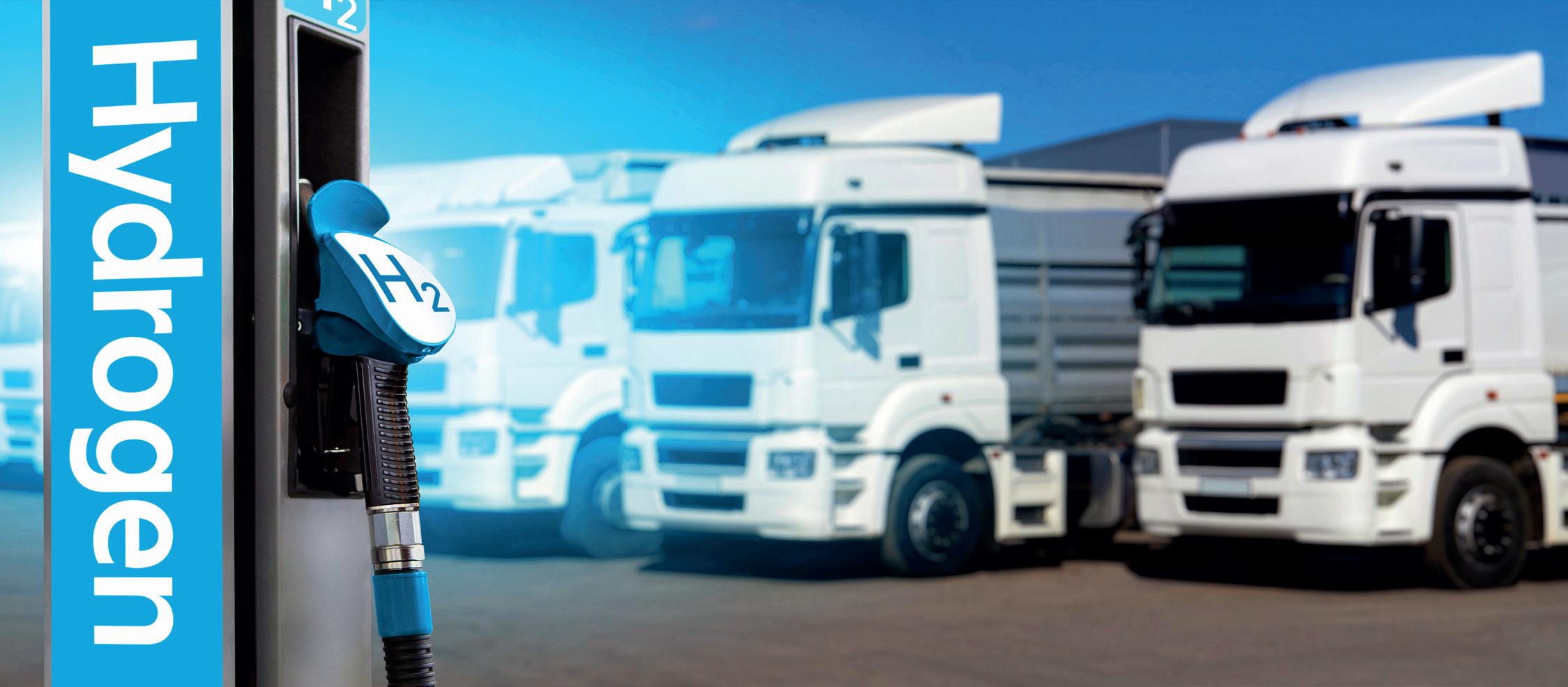
For more information: www.nanosun.co.uk
Marking another year maintaining the Carbon Neutral International Standard across its operations, the NRL Group is celebrating achieving a further 7% reduction in carbon emissions across a wider reporting scope thanks to continued improvement efforts.
Formally reviewed by the independent not-for-profit organisation One Carbon World each year, recent analysis of 2022 business operations saw more improvements in addition to the previous year’s 27% reduction. Since partnering with One Carbon World to calculate carbon emissions, the business has now successfully reduced emissions by 31.5% compared against 2020 figures.
An important measurement to gauge impact, carbon footprint per employee identified significant improvement, recorded as 1.46 tonnes CO2e per employee per year, representing a 29.4% reduction per person.
The NRL Group’s approach to become carbon neutral was implemented through two initiatives, a group wide focus on how to effectively reduce carbon emissions and investment in carbon credits to support global initiatives designed to tackle climate change.
Central to their impact has been volunteer carbon champions working in their branches, identifying practical and long-term changes that can be implemented to leave a lasting legacy, including switching to more sustainable suppliers. Included in the support provided by One Carbon World are suggestions as to how emissions can be further reduced in key areas such as energy consumption, together with adopting company-wide changes such as electric and hybrid company vehicles and reducing road travel.
Securing the Carbon Neutral International Standard certification also means the NRL Group can reaffirm its commitment to the United Nation’s Carbon Neutral Now initiative, an important movement that is challenging climate change across the globe.
The NRL Group provides the people that play an integral role on major projects across a range of critical sectors including renewable energy, power generation and infrastructure. From humble beginnings at Sellafield in 1983, today’s diverse global Group supplies a range of innovative recruitment resourcing, outsourcing and languages services. Technical contracting businesses also provide non-destructive testing (NDT) and rail services in safetycritical environments.
i
For more information: www.nrl.co.uk

Synaptec Ltd, the Scottish supplier of passive electrical monitoring systems for power networks, has received a substantial order from Proserv, the global controls technology leader, for sensor system assemblies.
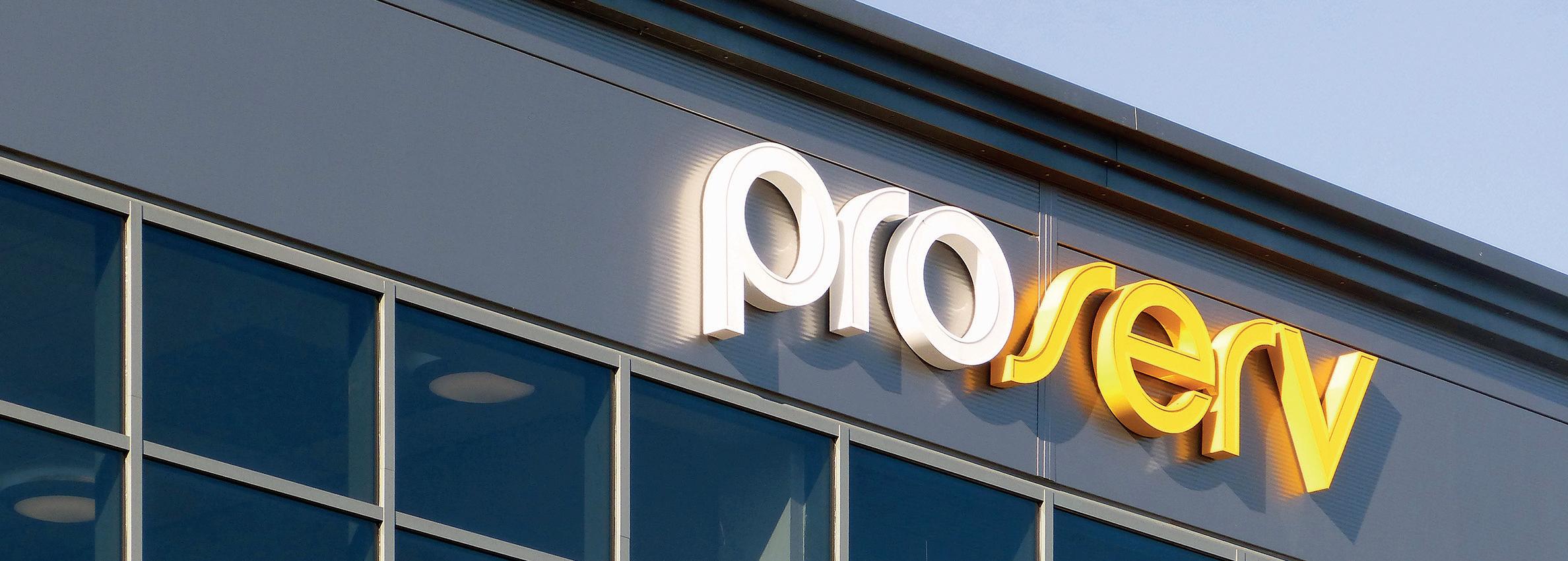
These will be integrated into Proserv’s ECG™ cable monitoring system for deployment on a major offshore wind farm to assess the condition and integrity of inter-array cables.
This year marks the 20th anniversary of Rollstud Middle East. It is celebrating 20 years of leadership and innovation.

Rollstud prides itself on continually improving its services and the quality of its bolting products and is looking forward to the future and all the possibilities.


Synaptec’s unique sensor technology provides remote and passive measurement of electrical and mechanical properties at a myriad of points within wind turbine arrays. The ECG system incorporates these measurements with other sensor data, providing the wind farm operator with real-time insights into the health and performance of the cable infrastructure.
i
For more information: www.proserv.com
The company is committed to enabling sustainable decisions by its customers and to driving sustainability in its operation, products and community. Rollstud thanks all its clients for their support over the years and looks forward to its next chapter.
i For more information: www.rollstud.com
Our ECG system is fast being recognised as the essential tool for the management of offshore wind farm cables. Davis Larssen, CEO, Proserv
Marine technology company
Sonardyne has launched its new Origin Acoustic Doppler Current Profilers (ADCPs). RS Aqua has been appointed as the UK reseller for the new Origin 600 ADCP.
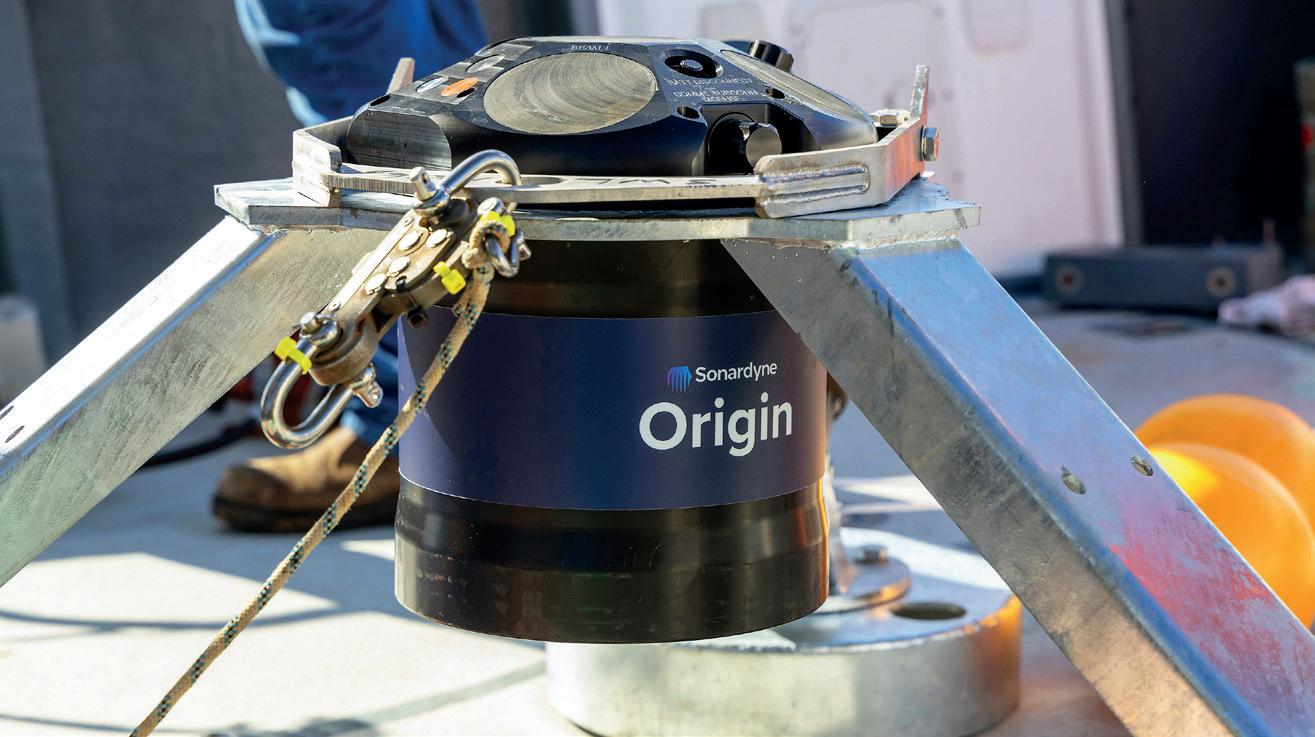
The Origin 600 sets new standards for intelligent ADCP data. It is the first ADCP to include an integrated acoustic modem and advanced onboard Edge processing – enabling remote access to all core features and giving high quality, intelligent data in near real-time.
We welcome RS Aqua as the UK reseller of Origin 600 and know the product will benefit their customers and business portfolio for years to come.
Michelle Barnett, Manager,It also delivers new and exclusive highfidelity data formats, while its ability to link to other external sensors allows you to get the most out of a single device deployment and the data generated.
Portsmouth-based RS Aqua has supported the UK marine industry for over 40 years. Its depth of knowledge and experience of supporting customers across a variety of sectors makes them an ideal choice as a Sonardyne reseller.
Through investment in people, technology and footprint, Sonardyne has built one of the most capable, dynamic and responsible businesses in the marine technology space. As a vertically integrated company with everything under one roof, together with its trusted supply chain and strategic partners, it can tackle your subsea project in ways no other solutions provider can.
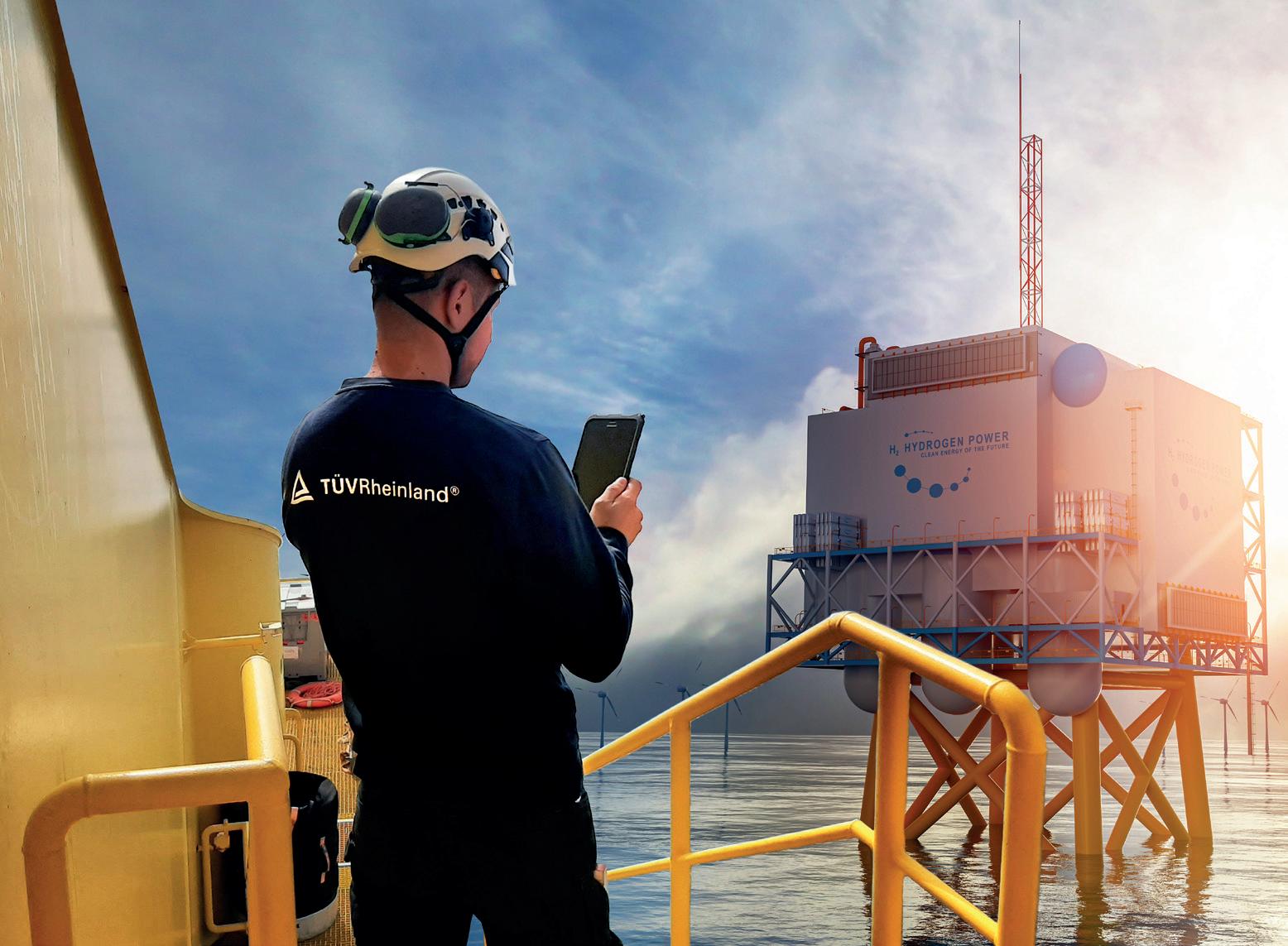
Spirit Energy, with the support of majority shareholder Centrica Plc and Stadtwerke München GmbH (SWM), has been granted a carbon storage licence by the North Sea Transition Authority (NSTA). This represents a further step towards its net zero vision of repurposing the North and South Morecambe gas fields for carbon capture and storage.
The announcement places the companies at the forefront of the decarbonisation efforts in the UK, with the MNZ (Morecambe Net Zero) Cluster having the potential to be one of the UK’s biggest carbon storage hubs.
It will be able to store up to a gigaton of carbon dioxide – the equivalent of three years’ worth of current UK CO2 emissions. It could initially store above 5MTPA of CO2, scaling in time to 25MTPA. The MNZ cluster will be able to accept CO2 transported by pipeline, ship and rail.
In April, Spirit Energy submitted a qualifying Expression of Interest for the MNZ Cluster to be considered as part of the Government’s Track 2 CCUS Cluster Sequencing process. The Cluster’s carbon stores will provide long-term access to a sustainable carbon storage solution for the UK’s carbon-intensive industries, helping tackle its emissions while still supporting the many thousands of reliant jobs across the UK.
i
For more information: www.spirit-energy.com

TÜV Rheinland has updated its certification programme for hydrogen. In doing so, the testing service provider has implemented the latest developments and requirements of the market. For example, the standard now incorporates supplementing directives 2018/2001 of the European Union’s Renewable Energy Directive II. In addition, TÜV Rheinland took into account new emission limits and extended the product scope to hydrogen derivatives (e.g. ammonia, methane and methanol) when certifying according to the standard. Launched almost two years ago under the name H2.21, the TÜV Rheinland standard aims to promote the use of hydrogen as an energy carrier by making transparent how the hydrogen was produced. The standard is internationally applicable. The production of hydrogen is highly energy intensive and is conventionally based on fossil energy carriers. Therefore, only the sustainable production and application of hydrogen has the potential to displace fossilbased energy carriers and consequently reduce greenhouse gases.
TÜV Rheinland stands for safety and quality in almost all areas of business and life. The company has been active for more than 150 years and is one of the world’s leading testing service providers. TÜV Rheinland has more than 20,000 employees in over 50 countries and generates annual sales of around €2.1bn. TÜV Rheinland’s highly qualified experts test technical systems and products around the globe, accompanying innovations in technology and business, training people in numerous professions, and certifying management systems according to international standards.
We want to use every opportunity to connect with our members, so please follow us on Twitter (@TheEICEnergy) and connect with us on LinkedIn –EIC (Energy Industries Council)
Below you’ll find a selection of some of the exciting EIC activities and useful industry information we’ve shared through our social media channels.

Join us for EIC CONNECT Energy USA 2023! Unlock the power of connections and expand your network at this exciting event. More information at http://bit.ly/44qgRRN
Go to EICTV to see GCC Energy Market and Project Update 10: it will provide you with an insightful update on the energy market. Watch it at http://bit.ly/3XU71Fe


The EIC is hosting a Walkathon on 15 August in London to celebrate our 80th Anniversary. To support our efforts, please visit https://lnkd.in/eb6J7Fgz and contribute.

23 August
23 August
Business
23 August

23
ADIPEC









23
23
23
24
29
29
5 September Business Presentation



in Rio: LNG Projects in Brazil Rio de Janeiro
5 September Overseas Exhibition
Offshore Europe 2023
Live, Aberdeen
5 September Overseas Exhibition Gastech 2023 Singapore Expo
6 September Management Course
12 September Corporate Entertainment Pre-OGA Networking Cocktails Kuala Lumpur

13 September Overseas Exhibition

Oil & Gas Asia (OGA) 2023



Kuala Lumpur Convention Centre, Malaysia
13 September Business Presentation
South America EICDataStream


Steel Dynamics is a part of a group of companies including Offshore Stainless Supplies Ltd, P&P Non Ferrous and Bornmore Metals, that offers customers across various industries a one-stop-shop for materials and processing.
Why we joined the EIC
We joined the EIC to be connected to like-minded companies driving the UK towards the net zero target by building a more sustainable future. The supply chain has a significant responsibility in driving sustainability, from the industries we support and supply into, to our internal practices we implement.
Steel Dynamics Ltd is one of the UK’s leading stainless steel stockholders and processers to the nuclear industry and other high integrity sectors

With continuous investment in machinery, stock, people and processing, the company continues to provide European origin high-quality stainless steel into these sectors. Due to the benefits and properties of this material, including high strength, durability and resistance to corrosion, this is being heavily used in the processing, storage and transport of hydrogen and carbon capture.
The hydrogen and carbon capture sectors are critical to the global effort to reduce carbon emissions and combat climate change
These sectors require high-quality stainless steel that can withstand extreme temperatures and corrosive environments. We are already involved in supplying stainless steel into hydrogen projects in the UK and the use of hydrogen as a clean and renewable fuel is gaining momentum. Diversification within the industry is important as we look up and down the supply chain. As the world transitions to a low-carbon economy, there will be a growing demand for materials and services that can support this transition.
The skills needed to support this diversification are out there and we are seeing this diversification with the stainless steel we are supplying to our customers. Customers from oil and gas sectors to cryogenic vessel manufacturers are demonstrating their versatility and adaptability to hydrogen.
Nuclear power will play an important role in achieving net zero emissions and creating a sustainable energy future This low-carbon energy source produces electricity without emitting greenhouse gases. While renewable energy sources like wind and solar are essential for reducing greenhouse gas emissions, they are not enough to meet the world’s growing energy needs. Nuclear power will provide a reliable source of baseload power that can complement renewable energy sources and help to reduce greenhouse gas emissions.
Steel Dynamics holds ISO9001, ISO14001, ISO45001, AS9100 Rev D, Cyber Essentials plus and EN1090 Ex Cl 4 accreditations. But our strength in nuclear power is due to our commitment to the ISO 19443 standard we hold.
We have implemented the ITNS (Important To Nuclear Safety) ISO 19443 ensuring our products and processes are of the highest quality to support nuclear new build and decommissioning. This has allowed the company to become a leading supplier of stainless steel material to the nuclear industry, providing critical components for nuclear power plants and other nuclear applications.
Our decision to open a 100,000 sq ft stainless steel facility therefore making room for a 40,000 sq ft carbon steel facility with nuclear in mind is a testament to the company’s commitment to the nuclear industry.
The new facilities will allow us to expand capacity and raise the standard of carbon steel processing to ISO19443.

We have designed a concept called Total Service Concept (TSC) to reduce waste and inefficiencies in the supply chain and effectively sell our customers less metal. The TSC approach is a testament to Steel Dynamics’ commitment to sustainability and responsible business practices.
The TSC approach is based on the principle of reducing waste and inefficiencies in the supply chain. Steel Dynamics has implemented several initiatives under the TSC approach to achieve this goal. These include a comprehensive stock management system to ensure customers have the right amount of metal at the right time.
This system helps to reduce waste by minimising excess inventory and ensuring that customers only order what they need. Another part of TSC is offering bespoke solutions to customers.
The aim of this being to reduce waste by ensuring that customers receive the exact metal they need for their specific applications.
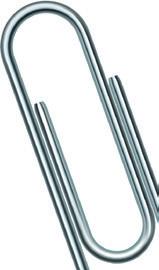
The TSC approach offers several benefits to our customers. These benefits include:
• Cost Savings.
The TSC approach helps to reduce waste and inefficiencies in the supply chain, which can lead to cost savings for customers.
• Environmental Sustainability.
The TSC approach helps to reduce waste and promote environmental sustainability by minimising excess stock and reducing the amount of metal used.
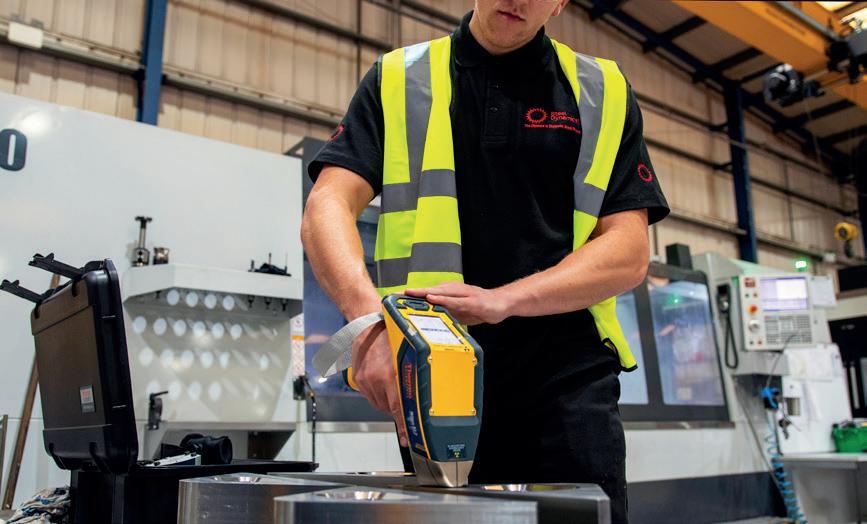
• Improved Efficiency.
The TSC approach helps to improve efficiency in the supply chain by ensuring that customers receive the right amount of metal at the right time.



Reducing our carbon emissions is only one part of the sustainability framework and as well as the company’s strong commitment to the environmental aspect, social and governance must also be considered when driving a more sustainable future.
We have implemented a comprehensive ESG sustainability framework to guide our operations.
The company’s framework is based on three pillars: environmental sustainability, social responsibility and corporate governance.
Steel Dynamics has implemented several initiatives under each of these pillars to ensure that its operations are sustainable and responsible.
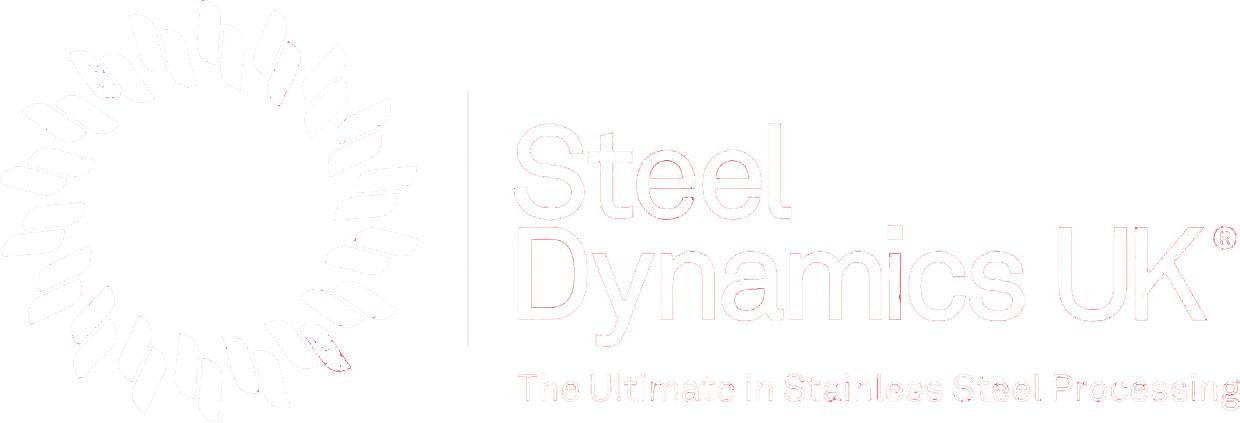
We have recognised the importance of our people as part of the social sustainability. Our commitment to our employees growth, development and wellbeing not only benefits the individuals but also contributes to the growth and success of the company as a whole.
The engineering industry, like many other industries, is facing a skills shortage. This makes it even more important for companies like ours to invest in their employees and provide opportunities for growth and development as well as showing we are driving a sustainable future. By doing so, the company can attract and retain top talent, ensuring that it has the skilled workforce it needs to succeed.
Our commitment to our people can take many forms, including training and development programmes, mental health first aiders, private healthcare, cost of living benefits packages and a positive work environment. By investing in its employees, we can create a culture of excellence and innovation, where employees are motivated to perform at their best and contribute to the company’s success.

Strengthen your brand in global markets with the support of the EIC’s International Trade team. The International Trade team manages UK and EIC pavilions at some of the largest and most influential energy events across the world.

In addition to this we also run a series of trade delegations which can be particularly beneficial for companies trying to break into a new export market.
See below listing of the current events we have planned for 2023 and 2024, along with a guide price at each, to support in your budgetary planning.
Camilla Tew, Director, International Trade camilla.tew@the-eic.com
The UK and Europe team has had a busy summer with a great variety of live and webinar based events.
We were delighted to host our first virtual solar event on 12 July – Sustainable Scalable Solar Power – giving attendees a chance to find out more about the UK’s solar projects and opportunities available to the supply chain. This webinar heard from Lightsource bp, Low Carbon, YLEM Energy, Pegasus Group and EIC, as speakers discussed scaling up the use of solar power to a more sustainable energy system.
If you missed last months webinar, please feel free to revisit the discussions which can be viewed on EICTV www.the-eic.com/EICTV
On 13 July EIC and Mott MacDonald partnered together in London to host Beyond Hydrogen – What’s Next? This event explored the supply chain dynamics and the immense potential for growth beyond the current hydrogen economy, including green hydrogen, e-fuels, sustainable aviation fuel and storage terminals. We were also delighted to carry on these important discussions, as we hosted a round table with speakers and financial institutions.
As more cutting-edge nuclear technology emerges across the UK and Europe, EIC and NDA partnered together to deliver a webinar on 19 July. This was a great opportunity to engage with an audience of 80+ as speakers showcased their advancements in nuclear technology and the vital role this is playing in the transition to a low carbon economy.
Jo CampbellThis month EIC is celebrating our 80th anniversary by hitting the streets of London to raise money for the National Trust by walking 80km in a day. We would appreciate any donations from the industry with all proceeds going to The National Trust to support its tree planting programme. To show your support, please head to our Just Giving page https://www.justgiving. com/page/eic80for80?utm_term=3zJdkwa4v

There is still time to book to attend some of our August events throughout the UK. On 23 August ETZ and EIC will be holding a Masterclass on Green Hydrogen in Aberdeen. Digital Transformation: Making the Difference, hosted by Petrofac in Aberdeen on 29 August and Energising The Humber: Humber’s Renewable Energy Revolution on 31 August.

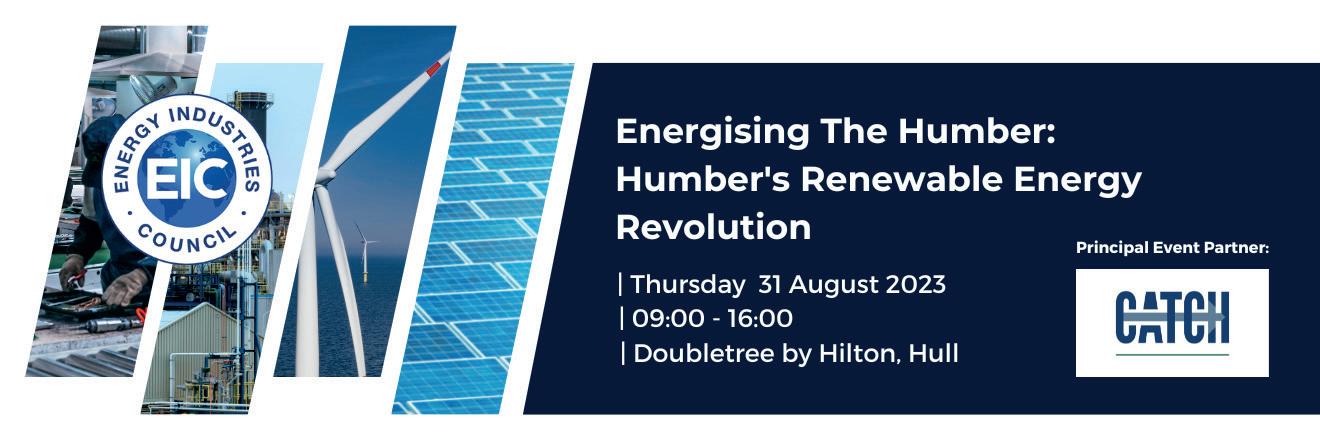

September: register to attend any of our forthcoming events
Offshore Europe 5-8 September, Aberdeen
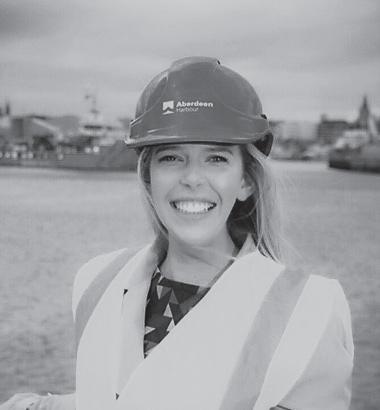
The Power of Collaboration (Day 1)
Navigating Net Zero (Day 2)
Decarbonising Oil & Gas (Day 3)
Skills (Day 4)

Celtic Sea: Floating into a New Energy Era
Tuesday 26 September, Cardiff
From Waves to Watts: Exploring Marine Energy
Thursday 28 September, Liverpool

With summer now well underway it provides an opportunity for many of us to recharge the batteries ahead of what always proves to be a busy second half of the year. This has been echoed through our recent roundtables and webinars where it appears that the majority of you are forecasting a busier second half of the year, where hopefully we will see several of the long-awaited projects across the region finally announced.
In my previous update I mentioned that I was interested to where you thought we should take the next EIC Connect in the region having already undertaken three in this calendar year (Oman, UAE and Baku). I am pleased to say that we are currently looking into hosting our first physical Kingdom of Saudi Arabia (KSA) Connect, which we hope to launch in the coming weeks. As we build up to this by the time we go to press we should have announced our first KSA Contractor Briefing scheduled to take place in September 2023, please check our website for further details. We have one further Connect event which we are currently in discussions over.
In addition to our regular Africa and GCC Market Update webinars, we are pleased to announce a CIS Market & Project Update taking place on 29 August 2023. This region is growing in importance for several of you, where it is our pleasure to place this in the spotlight and highlight several of the key projects that may be of interest to your organisation.
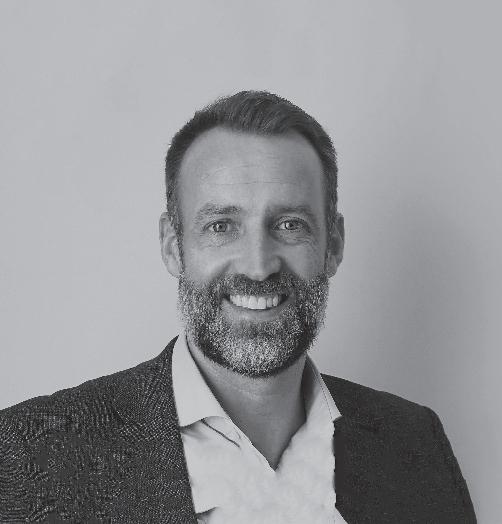
Our Regional Awards will take place in Dubai on 14 September, where not only did we have a record level of entrants within this year’s Survive and Thrive publication, the year has also seen a record number from across our regions, so expect a large number of winners on the night.
Investment in clean energy is set to reach US$1.7tn this year, outpacing spending on fossil fuels, as countries look to address potential energy shortages, according to the International Energy Agency. Global energy investments in 2023 are projected to reach US$2.8tn, with more than 60% allocated for clean technologies, including renewables, electric vehicles, nuclear power and heat pumps. It would be interesting to understand to what extend this is impacting your own business and subsequent sales pipeline.
A final reminder that ADIPEC will take place slightly earlier this year from 2-5 October 2023 due to COP28 taking place in the UAE in November. Being a month earlier please expect this to be hotter than usual.
Ryan McPherson Regional Director, Middle East, Africa, Russia & CIS ryan.mcpherson@the-eic.comKuwait Oil Co (KOC) is planning to pump nearly US$43bn into new oil projects in the next five years to expand production by nearly 200,000 barrels per day. The crude oil production capacity of the OPEC member currently stands at around 2.8m bpd and is expected to reach 3m bpd after 2025.

Omani authorities have awarded a US$6.7bn deal to build the world’s largest green hydrogen plant in Duqm. The award was secured by a consortium led by South Korean steelmaker Posco Group including Samsung Engineering and two other Korean state-run power companies as well as French energy major ENGIE and Thailand’s national petroleum company, PTTEP. Oman is planning to build one of the largest green hydrogen plants in the world in a move to make the oil-producing nation a leader in renewable energy technology. Construction is scheduled to start in 2028 in Al Wusta governorate on the Arabian Sea. It will be built in stages, with the aim to be at full capacity by 2038, powered by 25GW of wind and solar energy.
Please go to page 26 to see upcoming events around the world


On 19 July, EIC APAC hosted the second session of the Singapore Meet the Energy Players series at a member’s office in Singapore. The event was well attended by both members and nonmembers. This was followed by the Meet the Energy Players session in Indonesia in conjunction with Indonesia Petroleum Association Conference & Exhibition (IPA). We hosted a cocktail reception at our exhibition space at the conference, where we invited key energy players in Indonesia to network with EIC regional members. We had an attendance of close to 100.
Azman Nasir

EIC APAC also organised a webinar in mid-July on Opportunities in Indonesia’s Energy Sector. This webinar was organised as a precursor to IPA and provided insights into the Indonesian energy sector. A second webinar was held at the end of July on Energy Opportunities in the US Market as a precursor to the launch of the US country report.
In September, we are organising the EIC APAC Energy Conversations 2023 from 13-15 September 2023 at the Kuala Lumpur Convention Centre co-located with the 19 th Asian Oil, Gas & Petrochemicals Engineering Exhibition (OGA). EIC APAC has been selected as the official conference organiser. This conference is aimed at promoting focused conversations to encourage higher participation of Asian oil and gas companies to participate more aggressively in the energy transition, to exchange and share the latest concepts and approaches by international, regional and local companies on the solutions available in order to collectively achieve targets in net zero carbon emissions by 2030 and 2050 and to discuss solutions in the decarbonisation of oil and gas operations.
We are inviting experts from key local players such as PETRONAS, TNB, Sarawak Energy and Shell Malaysia, alongside regional national oil companies (NOCs) and other companies from Thailand, Indonesia, South Korea, India, Philippines, Taiwan and Vietnam; included also are international OEMs and MNCs such as Siemens, Wärtsilä, General Electric, Schneider and ABB, to speak on their topic of choice and network with the energy solutions providers who are our local members. We are also hosting business matching activities and will organise plenty of networking opportunities to benefit all the delegates.
Azman Nasir Head of Asia Pacific azman.nasir@the-eic.comBeach Energy has connected the Thylacine North 1 and 2 development wells to the Otway gas plant. The two wells are now delivering additional gas into the Australian East Coast gas market. As of May 2023, four of the six Otway development wells that were drilled as part of the major drilling campaign are now connected and have increased well deliverability for the Otway gas plant. Beach Energy is now reviewing its approach on connecting the last two wells.
It is reported that Shell is moving forward with the development of the project with start-up still targeted to be achieved in Q4 2023. Sapura Energy has installed the brownfield integrated module on the existing F23 platform that will be handling the producing gas. Work currently being conducted is the installation of the fibre optic cable between the F23 and Timi platforms. Phase 2 installation of the fibre optic cable between the F23 and Timi platforms is also ongoing.
Nepal and Bangladesh will finalise the investment modalities for the 683MW Sunkoshi 3 hydropower project and the two countries are looking forward to establishing a joint entity for the construction of the project. Nepal has provided Bangladesh with reports on the feasibility study and environmental impact assessment.
June began with the muchanticipated 2023 Energy Exports Conference (EEC). With over 1,700 registered attendees, forty exhibitors, eight hundred registered companies and over sixty speakers, EEC 2023 was held in Aberdeen, UK from 6-7 June.
I personally had the pleasure of attending EEC 2023 and moderating the Opportunities in the USA panel during the first day of the conference and the Opportunities in Brazil panel alongside speakers Tony Appleton, Offshore Wind Director, Burns & McDonnell; EIC’s very own Pietro Ferreira, Senior Regional Analyst, America; Katherine Zimmerman, Decarbonization Director, America, wood and Carlos Arentz, Director of Innovation and Industrial Technology, Acelen. I would like to extend a special thank you to these speakers for donating their valuable time and participating in a conversation around opportunities in the US covering offshore wind and carbon capture and opportunities in Brazil covering decommissioning, offshore wind and oil and gas. Beyond moderating a panel, I also had the opportunity to serve as a host for one-to-one networking meetings.
14

As June concluded, our region hosted its third event in the 2023 North & Central America Membership Open Day series. On 20 June 2023, we were joined by member company Core Group Resources. During this two-hour event, EIC members and non-members had the opportunity to hear a market overview of the region, network, win an EIC country report and hear a business presentation from the EIC member Core Group Services covering its services and its valuable relationship with the EIC and its membership. If any members in our region would like to participate in this series in 2024 or would like further information on how to attend the next Membership Open Day, please contact adriana.romo@the-eic.com
 Amanda Duhon VP & Regional Director, North & Central America amanda.duhon@the-eic.com
Amanda Duhon VP & Regional Director, North & Central America amanda.duhon@the-eic.com

The US has formally launched the National Clean Hydrogen Strategy and Roadmap, a broad framework developed by the country’s Department of Energy (DoE) for accelerating the various uses of clean hydrogen to enable it to contribute with decarbonisation goals across multiple end-use sectors in the future. The strategy is seen as a fundamental component for achieving a carbon-free grid by 2035 and a net zero emissions economy by 2050.
A group of eight northeastern US states, in a letter to the DoE, are asking for federal support to establish a collective effort aimed at planning interregional electrical transmission expansions and upgrades. The states are seeking to strengthen system reliability and facilitate a quicker and more affordable transition to a clean energy future.
Please go to page 26 to see upcoming events around the world
Join EIC South America for the upcoming Breakfast in Rio with PetroReconcavo, ENP and ABPIP who will present onshore E&P opportunities. Discover the immense potential and advantages of onshore exploration and production with industry experts.
In June, we hosted Breakfast in Rio featuring TotalEnergies and Halliburton as speakers. “The temperature in Brazil is something different,” was a quote by Jean-Baptiste Dupuy, operations director at TotalEnergies. He added that in 2020 the E&P sector brought investment of about US$4m, but is now seeing an average of US$8m per year with US$12m per year expected over the next four years. TotalEnergies has been making significant strides in exploration and production activities in Brazil, particularly with the Lapa South-West project. As the operator with a 45% stake, in partnership with Shell (30%) and Repsol-Sinopec (25%), Total Energies is driving the development of this project in the Santos Basin. The project involves the connection of three wells to an existing FPSO, with production start-up anticipated in 2025. This will lead to a substantial increase of 25,000 barrels of oil per day, ultimately reaching a total production of 60,000 barrels per day.
Guyana, South America’s most recent oil-producing nation, has announced a draft petroleum activities bill that will be open for public consultation. Intended to replace the existing Petroleum (Exploration and Production) Act of 1986, the bill aims to modernise Guyana’s legal and regulatory system for its emerging oil sector. The bill incorporates advancements and safety provisions concerning emergency response, cross-border unitisation, supervision and monitoring. It also expands regulatory scope to include storage, pipeline transportation and geological storage of carbon dioxide. Through the exploration of potential CO2 storage locations, Guyana is seeking to mitigate its carbon emissions.
The investment of approximately US$1bn demonstrates their commitment to unlocking opportunities and driving growth.
Daniel Garrido, business development manager at Halliburton shared his thoughts on its 65 years of contributions to Brazil’s energy sector, employing over 1,800 professionals in drilling and evaluation, completion and production and pipeline and process services.
Also in June, the Rio office held another workshop led by Professor Sayonara Eliziario, focusing on hydrogen and other low carbon energy technologies.
Clarisse Rocha Director – Americas clarisse.rocha@the-eic.com

The Fundamentals of FPSOs
Wednesday 9 August 2023
Breakfast in Rio: Onshore E&P Opportunities with PetroReconcavo, ENP and ABPIP
Thursday 17 August 2023
Breakfast in Rio: Offshore E&P in Brazil with MODEC
Thursday 19 October 2023
The European Union (EU) and its member states have launched the ‘Team Europe Project for the Development of Renewable Hydrogen in Chile’. The initiative aims to foster co-operation and support Chile’s renewable hydrogen economy as part of the EU’s investment strategy, Global Gateway. The project includes a US$4.38m technical assistance programme to promote renewable hydrogen in Chile, funded by the EU and the German government.


























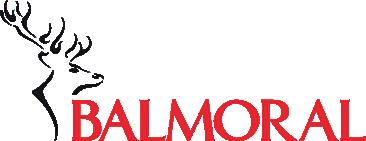

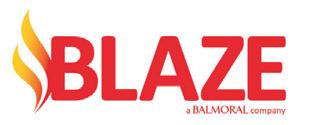









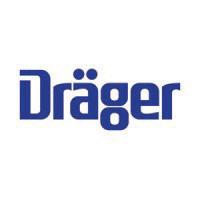



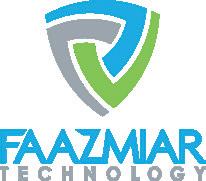






























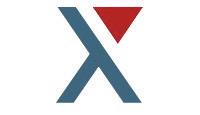

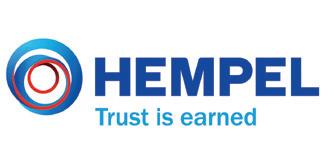

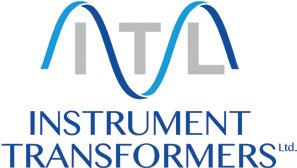




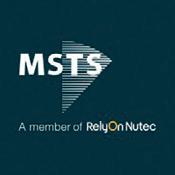


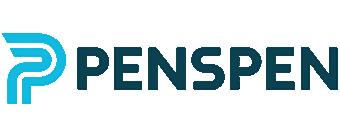
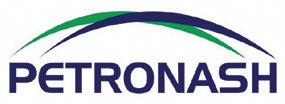


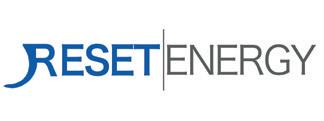







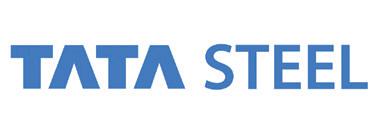

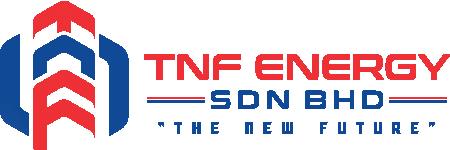








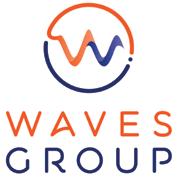





dry bulk and general cargoes to any compass point with the utmost efficiency, frequency and safety.
The onset of the global shipping crisis in 2008, combined with the crash in oil price in the middle of the last decade, presented a complex picture in front of AAL Shipping regarding the direction of its growth strategy.
Determined to expand from a predominantly AsiaAustralia serving business, the company has spent much of the last decade carefully expanding its fleet, building global trade lanes and responding to changing market conditions. Today, thanks to its decentralised approach and young and highly flexible fleet of heavy lift vessels, it is able to serve a huge array of dynamic industries, including energy and in particular renewables.
Singapore-based AAL Shipping has been supporting the industrial shipping needs of multiple sectors since 1995.
Energy is one of those industries. Today, it is one of the top five multipurpose operators in the world catering to large renewables, oil and gas, and other energy project transport needs. Indeed, the company houses the capability to transport its customers’ project heavy lift, breakbulk, steel,
In 2010, AAL set on a course of expansion. Typically trading between Asia and Australia, the firm set about building a global network served by fleet which was on the cusp of doubling from 14 to 30 vessels.
However, getting to this point has not been straightforward, not least because of the prolonged global shipping crisis and oil price crunch that arrived in the middle part of the last decade. As a result, AAL needed to rethink its strategy and come up with a new approach to better serve its markets and customers.
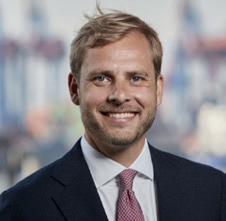
In response, the company, under the leadership of CEO Kyriacos Panayides, decided to decentralise its operations and built localised hubs in its core markets to be closer to its clients.
In terms of its fleet, AAL has also tested different growth models and has been actively involved in the design and build phase of its new vessels, a series of next generation, multipurpose heavy lift ships fit for the needs of modern industry. Indeed, one positive to emerge from the oil price crash of the mid-2010s was that it triggered a more urgent shift towards the development of renewable energy infrastructure around the world – this has proven to strongly benefit AAL as its fleet is suited to the transportation needs of the renewables sector.
Key to the success of AAL’s growth and pivot over the past decade has been the formidable base of knowledge that exists within the company, which today employs around 110 people around the world. These are individuals that know the world of shipping inside out, as well as the cargo needs and make-up of numerous industries, reflected in the superior design of its vessels that are integral in its ability to meet the demands of the market.
Today, AAL’s fleet is one of the largest and youngest on the market, comprising multiple vessel sizes with the flexibility in design, configuration and equipment to allow them to carry any cargo type and combination, including breakbulk, project heavy lift, dry bulk commodities, containers and general cargo.

It therefore is no coincidence that, despite global market challenges and upheavals witnessed over recent years, AAL has won more global awards for customer service than any other multipurpose heavy lift carrier – accolades bestowed by the same people with whom the company works every day.
As the global shipping market continues to experience unprecedented change, AAL’s ethics and brand essence remain unwavering. The company’s approach to business is underpinned by the slogan ‘powered by partnerships’, the future very much being defined by the building of long-term relationships with stakeholders in the market which are based on respect, service and mutual benefit.
AAL Shipping (AAL) is a multiple award-winning breakbulk, project heavy lift, steel and dry bulk commodity carrier which has since 1995 delivered competitive solutions for the world’s most dynamic industry sectors including oil and gas, mining, energy, construction and agriculture. It is one of the multipurpose shipping sector’s top five carriers by total fleet DWT and has built a reputation for dependability and going the extra mile for its customers.
Story type
#service & solutions (main category)


#collaboration, #culture, #optimisation
Benefits
• AAL Shipping has won many global awards for customer service.
• AAL’s fleet is one of the largest and youngest on the market.
Key findings
For industry
• Be agile and follow your vision understanding your business environment, capabilities, and clients’ needs.
AAL Shipping at a glance:
Key products and services: maritime transport.
Main industries served:
• Oil and gas – 20%
• Conventional power – 20%
• Renewables – 30%
• Others (infrastructure and construction) – 30%
Headquarters: Singapore
Year established: 1995
Number of employees: 110

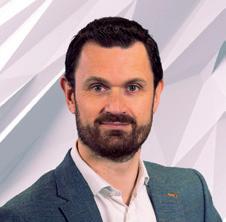

Collaboration has been front and centre of ABB’s strategy for several reasons.
Realising the opportunity to support energy transition journeys in the UK and Europe, ABB has pooled together critical expertise that has previously been confined to their own national markets. Its UK and Norway teams have led the way, introducing a range of formal measures designed to normalise collaboration and therefore enhance the value it can bring to various industrial projects and challenges geared towards net zero.
ABB has long supported the energy sector around the world by pushing the boundaries of technological innovation to support smarter, automated processes.
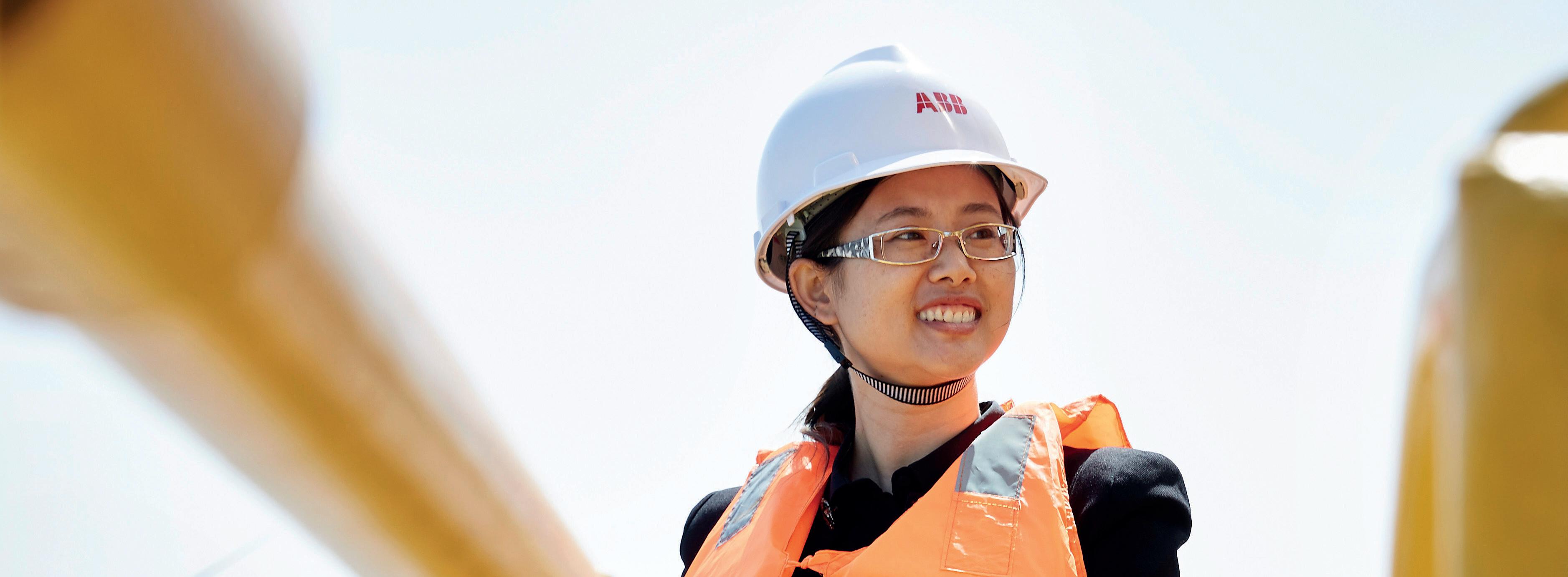

In the UK, the company sees a wealth of opportunities to contribute to not only the country’s energy transition journey, but also a range of existing and newly emerging subcategories that are on the verge of scaling up rapidly.
But how can this potential be unlocked, and how can ABB position itself to play a key role?
For the company’s UK and regional leadership, collaboration both internally and externally is critical to maximising the potential of its own expertise and the wider value chain.


First, European governments have differing aspirations and goals around energy transition and net zero, and their strategies are complex due to in-country nuances and local market dynamics. This results in different types of projects emerging from country to country, meaning ABB’s businesses in these markets are having to build up skillsets to match. For instance, Denmark is already home to advanced district heating infrastructure that ABB has been influential in developing – when the time comes in the UK, the Danish team’s expertise will prove invaluable.
The UK market is also full of industrial clusters where competition for funding threatens to stifle collaboration. ABB sees that it is in a prime position to bring continuity and share innovative solutions across clusters and is already steering conversations in areas such as the North West Hydrogen Alliance – when the time comes to ramp up activity and make progress, having the volume and spread of expertise to draw upon will be a competitive advantage.
ABB has been working on how to bring its combined capabilities to the table in the UK since the government cemented its net zero plans in 2020.
Since then, the company has been identifying its strengths across national borders and defining the potential benefits to be reaped in sharing expertise between divisions.
Collaboration between the UK and Norway teams has been a particular focus. After face-to-face meetings were held in both countries, the two teams began together
a formalised model designed to maximise their shared interests and build trust. The core guiding principles have been defined along with the benefits expected to yield for each stakeholder, while a continuous follow-up and feedback loop has also been established with buy-in, crucially, coming from the top.
Perhaps the most important developments have been the introduction of combined targets, re-aligned sales structure, amended job titles for those working between the two countries, and appointment of a new programme manager to oversee the collaboration.
The efforts invested so far are already starting to pay dividends. Two years ago, ABB had no joint pursuits in the UK and Norway in the fields of carbon capture, hydrogen and offshore wind – today, the standard approach is cross-country with multiple large-scale pursuits currently ongoing. In the UK market, this will involve adopting the already successful delivery model the ABB Norway team has established in its home market, which includes for example an EPC partnership with Aker. Conversely, learning from the UK market is benefiting opportunities in Norway.
External collaborations have also picked up. For example, earlier this year ABB and UK-based Pace CCS joined forces to deliver a digital twin-based solution that reduces the cost of integrating carbon capture and storage (CCS) into new and existing industrial operations. Together, the two companies will apply their respective expertise to make it easier for industrial companies to implement CCS infrastructure by lowering the CAPEX and operational investment required to enter this market.
Indeed, although a formidable global player in its own right, ABB recognises that solving the energy transition puzzle is a pursuit it cannot make headway in alone. By bringing together expertise, both internally and through external partnerships, the company is far better placed to support the UK and European markets on their net zero journeys.


ABB is a technology leader in electrification and automation, enabling a more sustainable and resource-efficient future. The company’s solutions connect engineering know-how and software to optimize how things are manufactured, moved, powered and operated. Building on more than 130 years of excellence, ABB’s 105,000 employees are committed to driving innovations that accelerate industrial transformation.
Story type
#collaboration (main category)
#energy transition
Benefits
• Profits from UK and Norway’s team collaboration.
• ABB and Pace CCS are collaborating to improve CCS infrastructure implementation by industrial companies.
Key findings
For industry
• Collaborate transparently and openly, (Internally and externally). Consider what the different parties can bring early on. Evaluate where parties can work together rather than compete. The winners will be those that are willing to collaborate.
For government
• Faster decision making linked to regulatory and financial funding decisions. Risk of projects commencing if unknown or delayed.
ABB at a glance:
Key products and services: Robotics and discreet automation, electrification, motion and process automation.
Main industries served:
• Industrial – 50%
• Transport and Infrastructure – 33%
• Utilities – 17%
Headquarters: Zurich, Switzerland
Year established: 1988
Number of employees: 1,800 (UK)
Revenue: £500m (UK)
Revenue from exports: 4% (UK)

on things, forcing Segal and the firm to cutback to a team of around 200.
Over the last 10 years, ABL Group has morphed into a global enterprise with the largest footprint of any independent energy consultancy.

Starting out as one of the firm’s first employees, cofounder and CEO Reuben Segal has built the business to a point where it now has 1,150 full-time equivalent staff on its books, this workforce spread across 62 offices in 39 countries. Much of this growth has been down to making savvy acquisitions to broaden its capabilities and capacity, a key component of this story being ABL Group’s bringing together of disciplines under one company culture in which everyone is pulling in the same direction.
The journey has been far from plain sailing, the company encountering many challenges along the decade-long path it has trod – an ongoing journey which Segal wants to lead to a billion-dollar organisation in the future.
Transforming a mid-sized company into a corporate giant is no easy task, especially for an energy sector consultancy firm which only sells billable hours to clients.
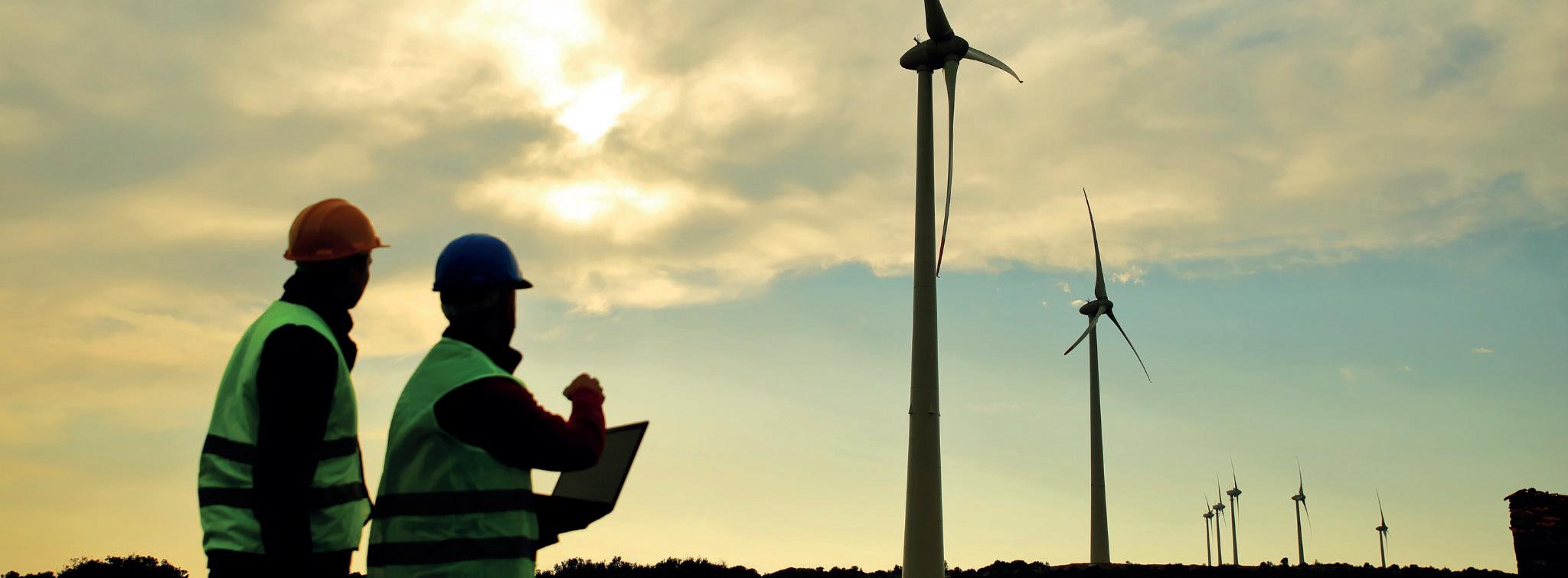
For ABL Group, the growth journey in its first two years was rapid. By 2015, it compromised of 350 employees, a trajectory that looked like continuing until the oil market crash that occurred between 2014-2016 put the brakes
Come 2017, the company was able to recalibrate and set out on a course towards growth once again. The challenge was laid out – to double in size every three years (through organic and inorganic growth) while increasing the share of revenue derived through work in renewables to 50%.
While expansion in the renewables segment has been largely organic (expanding at a rate of around 40% per year in line with its objective), a major driver of top line expansion has been a series of acquisitions made over the past five years.
In 2019, the company acquired Braemar Technical Services, a move which immediately doubled its revenue base and headcount. The following year, amid the covid pandemic, ABL completed the purchase of LOC, another oil & gas and renewables consultancy business which brought an additional 300 employees onto the books. By this time, and thanks to organic growth adding another 100 staff, the firm reached a point of being 800-strong.
2021 represented a critical transition year, a period in which Segal and his leadership worked to bring all entities within the organisation together under a ‘one ABL’ umbrella.
Segal himself moved into the position of CEO, part of a wider restructure which has seen tremendous strides made in key areas such as shared services and people development, the company’s leadership training services going on to prove themselves as industry leading. Today, for instance, ABL operates a shadow board made up

of under 30s to promote integration between the oil & gas and renewables parts of the business, and provide a bridge for younger recruits to advance their careers within the organisation.
In June 2022, another acquisition (Add Energy) was made, expanding the firm’s expertise in well engineering and asset integrity management, while also enabling it to move into carbon capture.
By the end of last year, ABL Group had grown into a US$168 million business with a globally distributed team of 1,150 people. Crucially, it is supporting its mission to help energy and oceans decarbonise by obtaining 50% of its income from renewable and energy transition-related sectors by 2025 – a goal which it’s on target to achieve, largely through organic growth, that has been driven by a team which enjoys a near 100% retention rate.
Meanwhile, ABL Group’s margins are also improving alongside its expanding revenue base. Hovering around 3% EBITA a few short years ago, profitability is now in the double digits. This is feeding into a share price which stands at a record high.
Indeed, momentum is clearly building, and Segal and his team are showing no signs of slowing down. In April this year, ABL Group closed the acquisition of AGR, a multi-disciplinary engineering consultancy and software company. The acquisition brings additional 400 headcount and a further US$75m of revenues.
By the end of 2024, the company wants to be 1,700-strong with an annual turnover of $300m, in line with its objective to be doubling in size every three years. If it carries on scaling at this rate, the ultimate ambition of becoming a billion-dollar organisation will soon be within touching distance.
ABL Group is a leading global independent energy and marine consultant working in energy and oceans to derisk and drive the energy transition across the renewables, maritime and oil & gas sectors, offering its clients the deepest pool of world-class expertise across marine and engineering disciplines from more than 300 locations worldwide.
Story type
#scale up (main category)
#people & competency
Benefits
• Targeting 50% of income coming from renewables and energy transition-related activities.

• Profits achieved double digits, share prices at a record high.
Key findings
For industry
• Take all learning opportunities with an open mind.
• Deliver what you say – people lose faith quickly.
For government
• Be honest and balanced. It’s impossible to flick a switch: have a real story of how to get to net zero.
ABL Group at a glance:
Key products and services: Energy consultancy in all energy and maritime/shipping sectors, with new mission statement – Working in energy and oceans to de-risk and drive the energy transition.
Main industries served:
• Oil and gas – 49%
• Renewables – 31%
• Others (maritime/shipping) – 20%


Headquarters: London, UK Year established: 2012 (AqualisBraemar LOC formed in 2020)
Number of employees: 1,500
Revenue: £216m
Revenue from exports: 42%



Affinity Test Services has managed to break the mould in the field of inspecting for corrosion under insulation (CUI) in Malaysia. Up against a well-established method which oil and gas operators had relied upon for decades, the company is starting to reap the rewards of a persistent marketing and demonstration campaign that has seen it win over the minds of many. Today, it still stands as the only non-destructive testing (NDT) company in Malaysia that has acquired real-time Xray inspection capabilities.
The challenge
Malaysian firm Affinity Test Services first entered the country’s oil and gas market a decade ago. A provider of asset integrity management services, including routine plant online inspection, turnaround inspection, fitness for service assessment and non-destructive testing, the company stands as an important partner for operators seeking to remain compliant with health and safety regulations in a range of important areas.
Central to its offering has been sustained investment in real time Xray, a pioneering and new method to inspect the problem of corrosion under insulation across oil and gas assets.
However, as with many incumbent techniques and ways of doing things, especially in traditionally conversative markets such as this, transitioning to new methods is not always an easy sell. If an existing method isn’t broken, why fix it?
To establish itself in the market and make inroads, Affinity has been engaged in a prolonged awareness generating exercise ever since it acquired this technological capability around five years ago.
An immediate point in the company’s favour is that the problem it is helping to solve is a common one faced by oil and gas asset operators. Indeed, corrosion under insulation is typically caused when insulation becomes wet. This can happen for several reasons – water ingress beneath the weather barrier (jacketing), moisture condensation from steam tracing leaks, cooling tower drift or ambient air in humid and windy climates.
Traditionally, the most common way to inspect for CUI is to cut plugs in the insulation that can be removed to allow for ultrasonic testing. However, where Affinity differentiates from conventional methods lies in the fact that radiography (Xrays) can be applied to detect corrosion without requiring the removal of insulation.
Although the benefits of utilising this technology are clear, especially in regard to cutting asset downtime, achieving buy-in during the early years was extremely challenging. Not only did operators generally prefer to open the insulation cladding and perform visual inspection with their own eyes, but the Xray technique Affinity was bringing to market was also untested and unproven in Malaysia, with no track record to help lure prospective customers.
There was only one viable solution to this problem. In order to convince operators to place their faith in a new CUI inspection technique, the company needed to put its solution in front of as many decision-makers as possible.
This has required a full-scale programme of marketing and demonstrations. Affinity has also performed site trials for pilot projects and, slowly but surely, it began to develop an all-important track record for performing this inspection technique in Malaysia. And such is the confidence the company has in the Xray solution, it committed to a significant initial investment to carry out the initial trial process without charging the end user.
This persistence has started to pay off. After several years of proving the concept and generating awareness, the technology is now being embedded into several operators’ processes across Malaysia, with Affinity’s first contract for CUI inspection services being landed with PETRONAS Carigali Sdn Bhd.
A growing orderbook has also contributed to stronger revenues, with revenue for 2022 recorded at almost RM 15m (£2.6m) compared to around RM 8.4m (£1.5m) in 2018. Indeed, as more and more success stories and real-world deployments are undertaken, Affinity will only see momentum around its real-time Xray solution gather strength.


Affinity Test Services, established in 2012 and previously known as NDT Advances, is an organisation based in Miri, Sarawak, Malaysia. The company provides non-destructive testing services and consultation in accordance with international and national standards for quality and integrity assurance. Affinity Test Services contributes solutions to oil and gas industries, civil or advanced construction industries, plantation and agricultural, mining, powerplant or, essentially, any organisation within any industries which requires quality assurance and integrity check via non-destructive test.
Story type
#technology (main category)
#resilience
Benefits
• Almost RM 15m in revenue in 2022.
• Affinity Test Services’ technology under use by operators across Malaysia.
Key findings
For industry
• Always be open minded to look for solutions.
• Expand your networking to have access to knowledge and information.
For government
• Companies need incentives in terms of reduction in tax and more simplified administrative procedure.
Affinity Test Services at a glance:
Key products and services: Asset integrity management services including routine plant online inspection, turnaround inspection, fitness for service assessment & non-destructive testing.

Main industries served:
• Oil and gas – 100%
Headquarters: Miri, Malaysia
Year established: 2012
Number of employees: 70
Revenue: £2.6m
Before AIS placed greater emphasis on Brazil, the company was selling just one thermal insulation product in the region – its ContraTherm® C55 solution, a phenolic compound designed for use in high temperature and high-pressure environments.



A leader in the engineering, manufacture and application of insulation and passive fire protection systems, buoyancy, and SURF (subsea, umbilical, riser and flowline) products, AIS Brazil has helped the wider AIS Group futureproof with diversified interests in new markets.
Thanks to an effective, locally-driven operation, strong local client relations and a 100% Brazilian team driving innovation and automated manufacturing process development, AIS Brazil now accounts for a fifth of the wider organisation’s global revenue.
In 2018, due to the oil price changes, AIS had to further diversify in order to keep its revenue and profits while project opportunities shrank as the market equally became increasingly competitive. With ambitions to expand its scope and capitalise on new opportunities in the export market, having the AIS subsidiary in Brazil is key to supporting and achieving the group’s objectives.
The fortunes of the entire group became largely dependent upon the success of the regional entity. Specifically, the firm needed to successfully roll out new thermal insulation solutions for subsea solutions in the Brazilian market in order to diversify the firm’s interests and futureproof effectively in the face of tough global market conditions.


With C55, AIS Brazil had successfully established sales to several major clients. However, the group subsequently identified opportunities to introduce ContraTherm® C25 into the market – a flexible, silicone compound insulation injection moulded solution for dynamic structures subject to flexure.
Critically, C25 has a thermal performance that is superior to many alternative solutions offered in the market. However, convincing the Brazilian market of its qualities was no easy task.
In Brazil, Polyethene and Polyurethane had been used almost universally. It was well-known and proven, making it difficult for many prospects to consider adopting alternative solutions. To bridge this gap and improve awareness and understanding of C25, the firm opted to market and deliver it in a localised manner to better fit the specific needs and context of the country.
This was a long road, the company pursuing its localised strategy over the years before receiving its first contract that involved C25 in Brazil in 2020. However, through its qualification work to fit Petrobras’s requirements, AIS Brazil found the case study to showcase the value of investing in a more suitable product to the rest of the country.
Indeed, this provided the confidence for AIS to continue investing in the Brazilian market, the group transferring all its skills and technologies from the UK to the localised facility in Jaguariuna that is operated by 100% Brazilian employees.
With that said, the regional subsidiary has also served to drive significant group-wide innovation on several fronts.
Critically, local engineers at the factory successfully began to automate their manufacturing processes, for another product line known as flexible jackets for thermal and passive fire protection applications. This was made possible when a control system using QR codes that automates the product conception process, with a 3D scanner used to transfer design information automatically was developed. Through each step of the production process, employees can scan a QR code and check what’s required next. This can be done anywhere in the world, making it possible to check production information across any AIS factory.
Developed at AIS Brazil, this technology is now used in Canada, with AIS planning to implement it within its factories in the UK. Not only does it help to optimise processes, control stock and production, and reduce waste, but equally it ensures clients receive (with the product) a scheme detailing assembly processes and maintenance procedures through scanning the QR code – this innovative process is unique to AIS, and they are proud to have conceptualised it in Brazil.
Ensuring AIS Brazil became an independent, effective, and successful localised operation in this manner has been vital.
The company arrived in Brazil in 2013, yet management of this operation remained in Britain. However, in the face of the Lava Jato and the petroleum crises, there was a need to localise what was done internationally for costs purposes. Also, to gain a better understanding of the local market, the group needed to establish better relations with key clients in Brazil.
Indeed, through unwavering commitment driven by the localised AIS Brazil team, this has been successful.
Where the country previously represented less than 3% of global revenue for AIS, it accounted for 20% in 2022. As AIS Brazil has grown, the group has as well. Indeed, the regional operation initially started with just one individual in 2013 and now comprises 75 local workers.
By successfully bringing what the wider group had and tailoring it for the local market while ensuring local employees drive and enhance its national operations on the ground, AIS Brazil has become the biggest player of thermal insulation in the local market.
AIS is a global leader in the engineering, manufacture, and application of insulation and passive fire protection systems, buoyancy and SURF products. Their advanced materials deliver mission-critical solutions for the energy, industrial, automotive, chemical, and marine sectors.
Story type
#digital (main category)
#diversification
Benefits
• Increase in participation of the AIS global revenue, from 3% to 20%.
• The automation of the manufacturing process created in Brazil are being implemented in other regions.
Key findings
For industry
• Take risks. There’s no growth without risks.
• Understand the market around you and communicate.
For government
• Invest in the qualification of manpower and re-open the technical schools.
AIS Brazil at a glance:
Key products and services: protection, insulation, fire protection, flexible jackets, contrablast, passive fire protection, jet fire protection, renewables and automotive.

Main industries served:
• Oil and gas – 80%
• Others (sugarcane burning, biomass) – 20%

Headquarters: Gloucester, UK
Year established: 2013
Number of employees: 75
Revenue: £4.2m
Revenue from exports: 5%


What’s more, it is impossible to design a blanket solution for all situations to fast-track production and gain a competitive edge this way, not least because AIS needs to consider site conditions, interaction with other materials at the location and other vendor’s products used at the site, among other factors.


Faced with the prospect of falling behind and competing in a congested market for protective solutions, AIS made a brave decision in 2018 to pivot towards more complex and demanding projects. Its Middle East team has emerged as a global centre of excellence for the entire group, driving the uptake of its highly advanced ContraFlex® system which is being implemented successfully in numerous parts of the world.
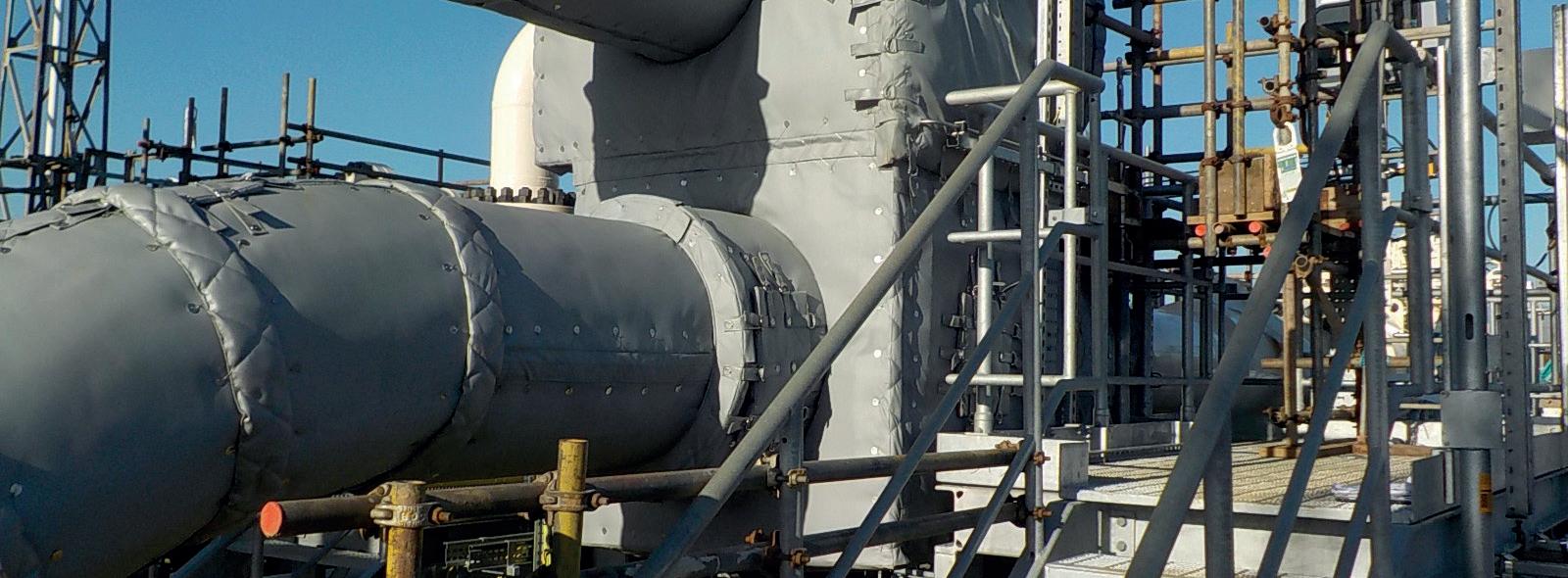
falling types
Any company reliant on custom from the oil and gas sector has faced headwinds over the past decade. Volatile prices and uncertainty across the supply chain have impacted clients’ confidence in committing to various types of spend, with many projects also put on hold during the pandemic.
For AIS, this is one of a series of challenges that are continually changing based on where and for who it is working for.
The company is engaged in the design, manufacture and installation of bespoke and customisable high performance ContraFlex® systems for passive fire protection, cryogenic jet protection, thermal insulation (high temperature and cold conservation) and acoustic protection. It is a niche market, but one that is still subject to intense competition due to a lack of comprehensive standardisation that leaves implementation of projects open to varying interpretations in different jurisdictions.
Faced with such a varied set of circumstances, in 2018 the company’s leadership decided a critical strategic change was needed.
Rather than compete side-by-side with other players in the market, AIS made a major pivot to focus more on distinctive projects that require innovative solutions.
Today, it positions itself as a value provider for its clients and engages more in generating awareness about the possibilities of its more creative ideas. In the process, the company’s Middle East branch has developed into a centre of excellence for ContraFlex® products, the unit now serving as a key arm of support to the global team for export projects.
Indeed, the division has invested heavily in R&D and currently has 22 type approved products with third party providers like Lloyd’s Register, ABS and DNV.
The jobs also require a highly personalised and bespoke client service. Due to the varied nature of the challenges its customers face, AIS’s strategy is defined by an in-depth engineering process to provide the best solution that caters to the specific challenge faced by any single client. The solution is always bespoke, with AIS investing large amounts of time and effort into sharing its knowledge and operating practices with customers to build confidence.
In one such project for a refinery in California, US, the company provided passive fire protection solution for a roof structural steel, walkway and tower for a retrofit project for a selective catalytic reduction (SCR), an advanced active emissions control technology system. Here, ContraFlex® was chosen as a preferred product due to it being pre-engineered, offering considerable savings in terms of time spent on installation and cost – although the exact design could not be finalised until engineering was finished, conventional solutions on the market would take longer to implement.
With numerous project challenges posed for this scope especially with space constraints and PFP integrity, Contraflex® was able to solve most of the problem. Compared to the conventional insulation available in the market, ContraFlex® is easily removable for quick access for inspection and can be easily installed for critical equipment’s which requires to have minimum downtime.
All the engineering, design and manufacturing and logistics was overseen from AIS’s Middle East office in Dubai, underlining its status as a go-to global centre of excellence for the wider group.
Indeed, projects such as this are also helping to push revenues in the right direction. Over the 2021/2022 financial year, the Dubai team generated a 70% increase in turnover due to diversification and AIS strength in providing solutions for challenging problems in fire proofing and insulation. And although margins have been pressured by difficult economic circumstances driving up the cost of doing business, profitability remains stable.
Thanks to the bold decision taken in 2018 to target more innovative projects, AIS has been able to differentiate itself in what remains an ever-changing and challenging marketplace.
AIS is a global leader in the engineering, manufacture and application of insulation and passive fire protection systems, buoyancy, and SURF (subsea, umbilicals, risers and flowlines) products. AIS’ advanced materials deliver mission-critical solutions for the energy, industrial, automotive, renewables, chemical, and marine sectors.
Story type
#export (main category)
#innovation
Benefits
• An increase in turnover of 70% in Dubai.
• AIS takes on new types of projects.
Key findings
For industry
• Networking and collaboration will go a long way.
• Be resourceful, creative, and empathetic.
For government
• Have clarity on international trade and policies.
AIS at a glance:
Key products and services: Award-winning global supplier of insulation, passive fire protection, buoyancy, and cable protection systems.


Main industries served:
• Oil and gas – 70%
• Conventional power – 20%
• Others – 10%
Headquarters: Gloucester, UK
Year established: 2009
Number of employees: 31
Revenue: £3.9m
Revenue from exports: 75%

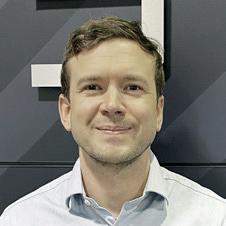
experienced its lowest annual profit performance in years. Critically, AIS moved away from upstream production, focusing on organic diversification as it entered the LNG, offshore wind, battery protection and downstream markets, seeing a degree of success in developing a new range of innovative products.

AIS has celebrated its 30th anniversary by reaching the mammoth £100m revenue milestone. Thanks to the transformative 2022 acquisition of CRP Subsea, an £8m investment in expanding its UK manufacturing footprint, efforts to scale up its buoyancy technology team from zero to 250 in five years, and successful, rapid diversification into LNG and offshore wind, the company is well placed to excel for decades to come.
AIS arrived at a critical juncture in 2018. The company had been grappling with issues stemming from the oil price crash – a challenge faced by many of its industry counterparts. At that time, the firm only dealt with upstream production, making it incredibly vulnerable to changes within a volatile market. Critically, the oil price changes impacted revenue, while profits and available work opportunities also shrank as the market became increasingly competitive.
AIS recognised it needed to adapt to overcome these challenges, opting to pursue a new two-pronged strategy of diversification and export opportunities.
This strategic shift began in 2018 after the company
Looking towards export opportunities, AIS identified Brazil (where it already had a subsidiary) as a region of realistic growth, and China due to the number of shipyards where its solutions are well suited.
The vast majority of AIS’ products are made in the UK before being exported, this approach protected employment opportunities and its intellectual property in its home market. However, in pursuing its export strategy, the company quickly saw a spike in demand for its products in various locations. This, in turn, required investment in manufacturing facilities and a higher headcount.
To fulfil the added requirement for buoyancy products in Brazil, for example, the company invested over £8m in a new 65,000-square-metre manufacturing facility and state-of-the-art equipment.
That said, the strategic move to target new product markets and regions wasn’t without its challenges. Indeed, these were strategic aims that would take time to gather momentum, with other firms typically utilising aggressive strategies to win a larger market share.

Here, however, an opportunity arose that would enable AIS to advance its diversification and export strategy more quickly. In 2022, AIS acquired CRP Subsea – a specialist in polymer and syntactic foam-based buoyancy and protection products for the offshore renewables and oil and gas industries.


This move was key. By adding new product ranges with a proven, reputable track record, highly skilled personnel and state-of-the-art facilities, the acquisition has significantly accelerated AIS’ growth strategy.
Ever since, thanks to its enhanced capabilities and capacity, the firm has been able to take on bigger projects with higher profitability.
Crucially, the new synergies have delivered cost savings and improvements in AIS’ margins, and the firm also successfully consolidated its position with a substantial increase in market share.
AIS is now at the forefront of all the key sectors it operates in across the renewable and oil and gas markets, both locally and globally. It is the second largest player in the market for CPS, second in buoyancy, first in subsea insulation, and first for bend protection.

Owing to these massive leaps forward, AIS has become a £100m-plus business for the first time in its 30-year history, the company now competes even stronger in a range of new regions and markets. Furthermore, it is a much larger entity than it was previously. Its buoyancy technology team has grown from zero to 250 in the space of just five years, for example.
Between its new facilities, capabilities, products and a vastly expanded headcount, the company has reached its milestone birthday in perhaps the best position it has ever been in, leaving behind any thoughts of adversity as it eyes a new and prosperous future.
AIS is a global leader in the engineering, manufacture and application of insulation and passive fire protection systems, buoyancy, and SURF (subsea, umbilicals, risers and flowlines) products. AIS’ advanced materials deliver mission-critical solutions for the energy, industrial, automotive, chemical, and marine sectors.
Story type
#diversification (main category)
#transformation
Benefits
• Company now worth over £100m for the first time.
• More facilities, capabilities, products and staff.
Key findings
For industry
• A solid business plan is key to success, but you also need the determination to see it through.
• Gather as much working capital as possible whilst everything is going well.
For government
• Return to the values of trade apprenticeships. They are not only key to the success of the business, but they provide lucrative careers as well.
AIS at a glance:
Key products and services: Award-winning global supplier of insulation, passive fire protection, buoyancy, and cable protection systems.


Main industries served:
• Oil and gas – 46%
• Renewables – 9%
• Others (automotive, marine, industrial, buoyancy) –45%
Headquarters: Gloucester, UK
Year established: 1993
Number of employees: 487 (UK), 632 (Global)
Revenue: £100m
Revenue from exports: 85%
offering significantly and better serve its customers, not only in the oil and gas industry, but energy transition technology markets such as hydrogen and CCS too.
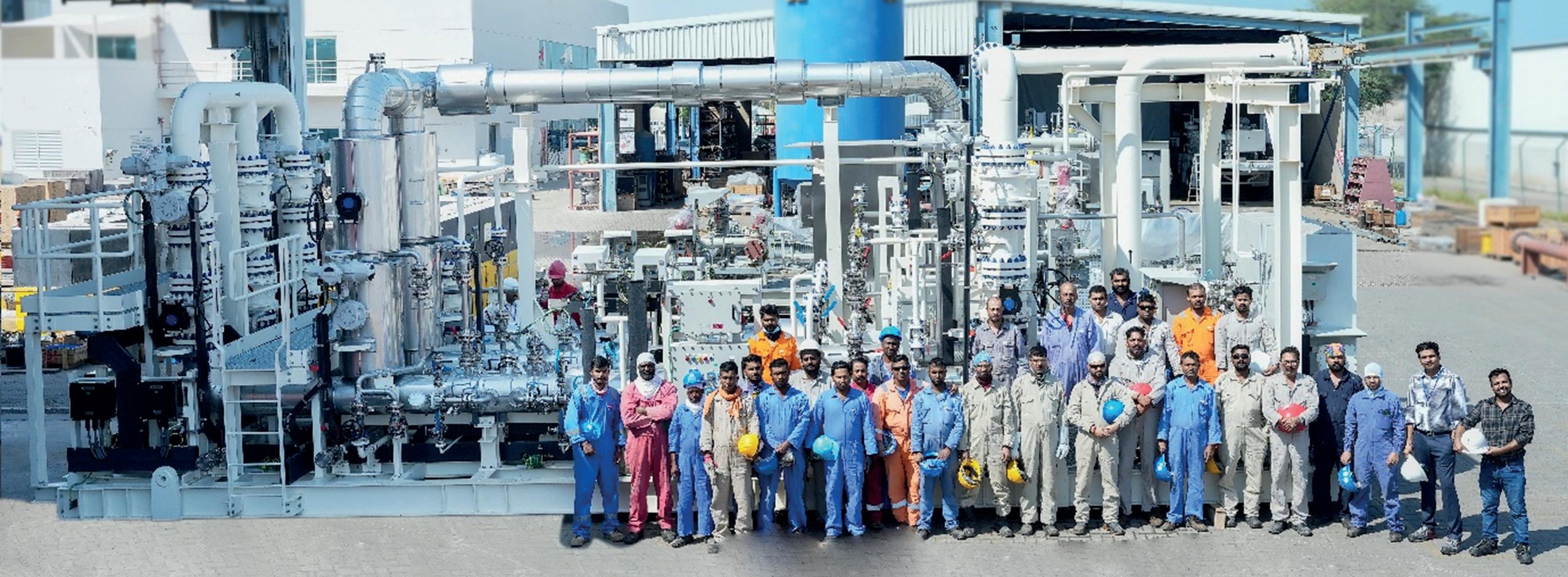


End-to-end integrated services provider Alderley has achieved a complete cultural transformation, updating and enhancing its innovation platform to improve its prospects. Underpinned by the launch of a new Special Projects team to deliver high-quality, quick-turn solutions for its clients, the company has firmly moved from loss to profit making, with significant growth potential extending far beyond 2023.
Established in 1989, Alderley has enjoyed a lengthy and successful history in the oil and gas industry, carving out its niche as an independent expert in system integration, with a primary focus on capital equipment. However, even established enterprises must negotiate challenges and periods of flux.
During the 2010s, Alderley found itself facing stiff competition in the market, with several large and ongoing shifts leaving it in a situation where standing still and not innovating simply became an unsustainable strategy.
The company also opted to conduct a wide-ranging internal culture study in 2019 involving team members from all corners of the business. By doing so, it identified several issues, including siloed teams, a lack of agility and few new initiatives that were limiting the company’s progress. The study found that product development and innovation was not prioritised within the existing culture, leaving it unable to improve its
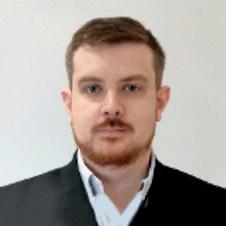

Not only did this limit the scope for growth and innovation, but it meant the erosion of margins in the face of strong competition and unfavourable economic periods, with Alderley recording losses in both 2018 and 2019.
To turn the tide, a new market-led strategy designed specifically to put the organisation on a new, more prosperous and sustainable path was agreed. As with all business strategies, it needed its people to succeed. It was decided that three key business behaviours would form the foundations of this strategic change: agility, ownership, and customer focus.
A company-wide audit in the form of a culture survey was key to understanding the challenges faced by Alderley. Here, two inter-departmental and international teams were empowered by Alderley senior management to investigate and discuss the existing culture of the organisation, and workshop potential business improvement ideas to address the challenges.
Once the business improvement process kicked-off, the firm evaluated various business changes implemented by other companies and examined how effective they may be in the Alderley context. Solutions were presented to the board and approved.
The use of inter-departmental teams was critical here, extending the reach of the initiative significantly through several “culture champions”. Through a continued process of communication and engagement as well as workshop activities and feedback, previously perceived “walls”
were broken down across previously siloed locations and departments, energising the team through cross-functional working that helped to inspire new initiatives. Key strategic hires further cemented this newly collaborative approach, including Martin Shaw as the Group’s CFO and Nicholas Doherty as the Group’s Head of Strategic Sourcing.
One key initiative that emerged was the establishment of a new Special Projects division in 2021. Composed of a team of both internally and externally recruited specialists, its goal is to fast-track projects, accelerate the firm’s innovation cycles, and deliver high-quality, quickturn solutions for Alderley’s clients.
Equally, this plugged a gap in the firm’s offering between its capital projects and field service work. This included upgrade and retrofit projects and small, fast-track capital projects, which Alderley had not focused on for over 20 years. Through a complete operational and cultural overhaul, Alderley’s capability to develop new processes, products and services has been supercharged, owing to refined focus and improved use of resources across the group.
The strategic shift has enabled Alderley to achieve status as an agile, customer-focused and solutions-oriented business, improving its innovation culture. New ideas are now deemed critical to the business and given priority. This ensures that the company continues to adapt and futureproof itself.
The results have also been telling. After successive losses, Alderley returned to sustainable profitability in 2022 – a position it hopes to build upon in 2023 and beyond. By the end of this year, the firm expects revenues to reach £80m and profits to exceed £3m.
Without question, the company has turned a corner, with significant growth potential on the horizon.
Alderley is the end-to-end integrated solutions provider for the global energy industry. The company’s priority is to maximise the value and efficiency of its clients’ energy assets – from concept to operation and beyond. Alderley’s regional teams work closely with its clients to understand their needs and deliver the right solutions – with the flexibility, integrity, and customer service you would expect from a family business.
Story type
#culture (main category)
#transformation
Benefits
• Sustainable profitability reached in 2022.
• Revenues and profit to reach £80m and £3m, respectively, in 2023.
Key findings
For industry
• Take organisational culture as one of your greatest allies.
• Always be ready to challenge the status quo.
For government
• Consider smaller, innovative companies when writing export finance support policies. They are engines for growth, exports, and energy sustainability.
Alderley at a glance:
Key products and services: Advanced digital, mechanical, hydraulic, electrical, process, metering, consultancy, systems, and aftermarket services.


Main industries served:
• Oil and gas – 95%
• Energy Transition – 5%
Headquarters: Wickwar, UK
Year established: 1989
Number of employees: 400
Revenue: £80m
Revenue from exports: 85%
Indeed, the company was always confident that it could perform well elsewhere given the many years of experience serving multinational companies such as Shell, ExxonMobil and Murphy Oil in Malaysia. However, little did it know a crash in oil price and global pandemic lied in wait, two challenges that would test the resolve and resilience of the company during the implementation of its bold expansion strategy.

Realising that it could no longer afford to rely on generating income from oil and gas-related activities from clients in Malaysia, Alypz has successfully diversified in a number of ways. As well as establishing itself in international markets such as Kuwait and Indonesia, the company has opened up new service lines and is also reaping the benefits of investing in R&D and product development – all of this being achieved amid a series of challenges in the form of the oil price crash and Covid-19 pandemic.


Alypz has been in the business of providing radiation safety and NORM (natural occurring radioactive material) solutions and services in Malaysia since 1985. With its own radioactivity and dosimetry laboratory, the company is fully in control of the delivery time and quality of service, a capability which has enabled it to assume the position of local market leader.
However, growth in its home market was becoming stagnant, the company realising that it was time to venture beyond Malaysia. In 2013, Alypz was awarded a three-year contract by Petronas Carigali in Turkmenistan to provide NORM Services, a success which inspired it to push on with growing into more international markets.
Having secured the contract in Turkmenistan, Alypz went on to receive project orders in Singapore, Myanmar and Indonesia. Alypz finally set up a permanent office in Jogjakarta, Indonesia in 2015.


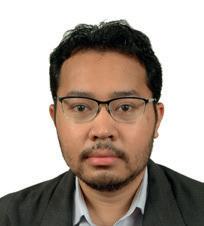
This was a natural move, not least because Alypz had recruited and trained the relevant Indonesian personnel many years prior. It enabled the firm to better engage with prospective clients in Indonesia and made the implementation of a permanent base in the market easier. The company also brought on board an experienced member of the international and local regulatory body as a consultant to guide it in making inroads in the country.
Then arrived the first major obstacle. With business revenues largely deriving from clients operating in the oil and gas sector, the oil price drop of 2015 had a major impact and prompted a change in thinking in three major ways.
First, the company knew it had to diversify its customer base not just geographically, but also beyond its traditional bounds of the oil and gas market and into sectors such as mineral processing and healthcare. Second, it needed to diversify its service offering for existing and new clients, adding additional value to its proposition through the provision of training and OSL services, for example. And third, Alypz recognised the need to ramp up investment
in R&D and collaboration with local universities to help develop new products that would complement and enhances its services.
Undeterred, in 2016 the company made a major breakthrough when the Kuwait Oil Company (KOC) awarded it with a twoyear contract to provide services around NORM study and NORM procedures development. Two more major contracts from KOC followed in 2019 in what has proven to be a flourishing client relationship, the latest project concerning the disposal of radioactive materials.
Shortly after securing the work in 2019, the Covid-19 pandemic arrived. This put the brakes on immediately, with the projects virtually lying idle for months due to lockdown. In addition, Alypz found that acquiring financing from its local Malaysian banks was difficult due to their unfamiliarity with the risks involved in contract scopes and being in a new market.
However, thanks to its ability to innovate and adapt to new customs, regulations and ways of doing business, the firm has been able to establish firm roots in both Kuwait and Indonesia. Today, its export revenues represent more than 60% of total turnover, with over 40% of its workforce now being located outside of Malaysia. Profitability is also on an upward trajectory, with provisional estimates for 2022 showing a strong growth in margins from 0% (2021) to 17%.
Meanwhile, since venturing into the OSL service line back in 2015, the company managed to recover the initial investment within two years and now commands a market share of around 40%. And its R&D activities are also bearing fruit, the company securing an order from Bangladesh Atomic Energy Commission for a new product developed in collaboration with Multimedia University (MMU). By May 2023, Alypz expects to have launched its very own survey meter which is currently undergoing SIRIM inspections.
Despite encountering numerous bumps along the way, Alypz has determinedly stuck to its diversification strategy. Today, it stands as a much broader enterprise that is no longer dependent on serving oil and gas customers in its home market, and there is plenty more to come yet.
Alypz was incorporated as Asia Lab (Malaysia) Sdn. Bhd. in 1985 and was the first company in Malaysia to have dual accreditation from the Atomic Energy Licensing Board (AELB) and the Ministry of Health. Alypz is the market leader serving all the top oil and gas companies in NORM/ TENORM monitoring services in ASEAN region, as well as providing comprehensive radiation safety services across various industries involved with radioactive materials and irradiating apparatus.
Story type
#resilience (main category)
#export
Benefits
• Alypz now commanding a market share of 40% approximately.
• About 60% of turnover currently coming from exports.
Key findings
For industry
• Take advantage of the financial assistance given by the government such as grants and soft loans.


• A prior understanding on different countries’ working culture, bureaucracies, and regulations can help in mitigating or avoiding any unwanted issues that can be costly when venturing abroad.
For government
• Government agencies should provide local intelligence that covers more countries.
Alypz at a glance:
Key products and services: Radiological and environmental consultancy.
Main industries served:
• Oil and gas – 65%
• Others (healthcare and industries associated with radioactive materials and radiation equipment) –35%
Headquarters: Subang Jaya, Malaysia
Year established: 1985
Number of employees: 89
Revenue: £2.5m
Revenue from exports: 60%
period. Nevertheless, the firm is continuing to grow by focusing on its purpose and cultural alignment of the teams.

Since acquiring a significant segment of Navigant Consulting in 2018, Ankura’s global footprint and services offering in Europe and the Middle East has grown considerably. Alongside a global collaborative approach, the success of the firm’s strategic growth is founded on a purpose-built firm combining service offerings to deploy the best team and support to clients globally.



Just a few years back Ankura laid out bold ambitions for global expansion which included the Europe and Middle East regions where it committed to provide clients with access to independent expert and advisory services by leveraging local, highly experienced and best-in-class teams with a global reach.
Germany was a key market as part of this strategic expansion in Europe. The business recognised the potential and importance of establishing a local team; subsequently an acquisition plan was considered to enable the firm to roll out iterative service lines and lay the foundations for establishing an Ankura team in the market.
Of course, building presence from the ground up is never an easy task, particularly in this case as it was set against a backdrop of economic crisis and the pandemic
As an example, Ankura’s global footprint provided Ankura with the ability to target the German market more effectively, enabling it to enhance its capabilities in a new market and build regional relationships that have become the cornerstone of the company’s success in the region.
Initially, Ankura launched two practices in Germany. The first, Risk, Forensics & Compliance help clients protect, create and recover value by identifying, analysing and managing risks and undertaking investigations for their businesses. The second, Construction Disputes & Advisory, is focused on offering technical advice and expert opinion to help clients assess and mitigate the risks inherent to infrastructure and capital projects.
Ankura’s global business has actively supported the growth of the German team enabling a rapid scale up of operations within the region which see it working with clients such as European energy companies with global operations. Culturally Ankura is team oriented and collaborative with significant cross-group initiatives, enabling the organisation to succeed across geographies by sharing critical expertise proactively and openly.
This latest venture is just one strand of an exciting Ankura story that has unfolded in recent years, underpinning the firm’s wider global growth programme that has seen it enhance its footprint and offering globally.
In 2021, Ankura not only opened its German office in Frankfurt, it also opened its India offices in Mumbai and Gurugram, and launched its European Restructuring practice. In 2022, the growth and export story continued with the launch of its global Sports Advisory practice and the opening of additional offices in Shanghai (China) and Riyadh (KSA).
This impressive expansion strategy shows no signs of slowing in 2023 with the firm acquiring leading sovereign debt advisor Newstate Partners, US-China strategy advisory firm GreenPoint Group, and Chartwell Compliance, a leading global regulatory compliance and risk management firm. It has also launched its Middle East Turnaround & Restructuring practice and Australia Disputes & Economics practice, as well as opening an office in Melbourne, Australia.
As a result of these efforts, the company’s global headcount has expanded significantly with over 2,000 professionals globally.
Ankura’s proven ability to bring newly acquired teams on board and move into new territories is presenting exciting opportunities for its clients as well as for the development of its team members. Ankura is perfectly positioned to continue with its ambitious growth plans and expansion across the globe through the remainder of 2023 and beyond.
With a collaborative approach, industry leading expertise and multidisciplinary capabilities, the company continues to assist clients in protecting, creating and recovering value in more and more territories across the globe.

Ankura is an independent global expert services and advisory firm that delivers services and end-to-end solutions to help clients at critical inflection points related to conflict, crisis, performance, risk, strategy and transformation. Collaborative lateral thinking, hard-earned experience, expertise and multidisciplinary capabilities drive results and Ankura is unrivalled in its ability to assist clients to Protect, Create and Recover Value.
Story type
#export (main category)
#collaboration, #scale up
Benefits
• Successful global expansion
• Enhanced local service offering to support clients globally.
Key findings
For industry
• Be a purpose-built firm combining service offerings to deploy the best teams to support the client.
• Be a leader for your team, right now more than ever.
For government
• Open channels to be able to do business globally.
Ankura Consulting at a glance:
Key products and services: Consultancy.


Headquarters: New York, US
Year established: 2014
Number of employees: 2,000+
establishing itself. Its small team of six to seven employees was ticking along nicely, until the Ukraine crisis changed the energy landscape almost overnight.
Rather than having a year to bed into the energy project resourcing and recruitment scene, the events of 2022 threw several challenges in the direction of Applica. Russia’s invasion into Ukraine shook up the market and created an uptick in demand from other energy producing regions – if the company did not respond appropriately by scaling up to fulfil this demand, it faced being left behind by its (often larger) competitors.
CEO Matt Halle, supported by his team, built up the company’s credibility and relationships by speaking to project directors on the ground, understanding exactly their needs and responding appropriately. This personal approach lay the right foundations for the company which has seen Applica double its own headcount and revenues in record time.
Having opened its doors to the energy sector in 2018, recruiting specialist Applica was embedding itself into various projects as a reliable resourcing partner – from FEED to commissioning, its hallmark is going on project journeys through entire lifecycles with clients.

Come 2022, amid the global economic hardships caused by the pandemic, the ambition very much was to continue
Applica was forced to re-think, re-invest and re-build. Needing to scale to stay relevant and take advantage of a huge opportunity, the key challenge was to grow its capacity to serve projects like its larger competitors – but, crucially, without losing the niche culture and family buzz that defined its DNA.
Doing so has been far from straightforward. Funding continues to be a challenge for players in the energy sector, with finance firms reluctant to commit to the industry despite it having a reasonable long-term outlook. Meanwhile, in Applica’s home market of the UK, there remains uncertainty as to what the long-term investment policy looks like, which is limiting investor confidence.
However, the company’s shareholders, along with its employees and other key stakeholders, have been extremely supportive throughout the scaling up process.


Central to Applica’s growth has been a restructuring of the organisation built around several important new appointments including Recruitment Manager for the UK and Europe, Country Manager for Norway and two senior leadership positions: Finance Director and Commercial Director.
Equally important has been safeguarding the original team who had built the company to this point in its journey. Here, Applica has plotted out a three-year plan for

each member to help them bed into the new structure, providing coaching and development opportunities along the way for those whose roles are being changed.
In terms of scaling up commercially, Applica had already built relationships with key personnel in the industry and this proved to be invaluable. It allowed the organization to identify exactly where to focus its energies.

Using its well-established credibility and experience, the company has been sticking to its gameplan by finding smart and controlled ways to scale through acquiring new clients and increasing the value of existing relationships. For its largest client, Applica has increased the scope of resourcing support it provides, moving into the execution phase of projects and now serving as the number one recruitment partner on the site. Revenue derived from this account has grown from £1m in 2021 to £3m in 2022.
Applica is also ramping up work with global clients supporting them with recruitment for projects in the UK, Norway and France.New client wins are helping to grow the company’s presence in the US energy market, a new win is already delivering on a $1.5m contract with a view to extending the partnership to the UK.
The business now stands on a firm financial footing. Thanks to the scaling up exercise, revenues have more than doubled in the space of 12 months to reach £11m in 2022 – a far cry from the £1m recorded in 2019. With momentum on its side, Applica looks set to thrive for some time to come.
The team at Applica are people-centric, diligent, agile, and innovative. The company’s head office, based in Manchester, serves both the UK market and acts as its global recruitment hub. Applica also has businesses registered in both Houston and Stavanger to support the energy markets of North America and Scandinavia and have solutions in place to support Europe and Asia.
Story type
#scale up (main category)
#culture
Benefits
• Revenue doubled within a year.
• Growing the company’s presence in the US.
Key findings
For industry
• Surround yourself with the right people, listen to them and don’t be scared to ask questions.
• Learn to trust your team even if you don’t really understand or agree with their decisions.
For government
• Develop a reverse engineering plan from 2050 net zero goals to our current state in 2023.
Applica at a glance:
Key products and services: Resourcing of projects globally, specializing in the projects space of the energy industry. Technical or commercial contractors.


Main industries served:
• Oil and gas – 75%
• Renewables – 12.5%
• Energy Transition – 12.5%
Headquarters: Manchester, UK
Year established: 2018
Number of employees: 14
Revenue: £11m
Revenue from exports: 40%
How is Arcadis thriving?
Arcadis has unlocked the passion of its employees to contribute to the worldwide sustainable and net zero journey. Missing out on energy transition opportunities due to its previously siloed structure, the company now operates with a series of global, expert-led communities that is helping it to make the most of its talent pool and collaborate across geographic borders.
Established for well over 130 years and with a workforce of around 37,000, built asset consultant developer Arcadis has well and truly made a name for itself in building and engineering circles all around the world.




But for even the most longstanding of companies, remaining relevant and known in the energy sector is never a straightforward task, especially given the cyclical and volatile nature of the industry which is forcing virtually all stakeholders to remain on their toes.
For Arcadis, until the turn of the decade, the energy arena had been all but closed off for quite some time. Its brand, despite having a huge and long legacy behind it, was not well known. Previous three-year strategy cycles had revolved around the company’s numerous country specific silos, limiting the prospect for collaboration between divisions. If the energy market was to be tapped successfully, this needed to change.
To avoid missing opportunities, Arcadis decided to veer away from its typical approach to three-year strategies when the time came to launch the latest plan at the start of 2021.
Energy sector expertise have been pulled into a dedicated energy transition team which now operates at a global level and focuses on five key growth areas – offshore wind, industrial decarbonisation, hydrogen, energy systems, and energy infrastructure and storage. The firm has moved some of its leadership to the division to drive the five growth areas (referred to as communities), with the majority of the teams made up of personnel located in the former regional businesses.
This will drive a more joined-up approach to doing business in the energy sector, removing the reliance on ‘who knows who’ to prompt collaboration between disparate colleagues and teams. These communities of expert practice are now much more cohesive, each office now utilising shared case studies and competencies. Indeed, the major upshot for clients is that they are now receiving more focused propositions and a consistent experience across different geographic regions, Arcadis moving skills across the globe to suit customer needs.
Creating these communities has been no straightforward or speedy task. It has required a significant investment of time and energy to formulate, the company creating a series of digital basecamps to calibrate internal systems
and access the experts needed to form these new groups.
This process is indicative of what is now a digital leadership and cultural model that has been rolled out across Arcadis on a global scale. Each Arcadian takes part in a digital bootcamp, an initiative that has proven transformational so far and helped to break down the silos which had previously been holding it back. Today, the company positions itself as global player with focus on scale and digital entrepreneurship.
In terms of the renewed focus on the energy sector, achieving buy-in for such a wholesale change in approach has been relatively straightforward, not least because it fits in well with the wider company push towards sustainability and mission to improve people’s quality of life through the work it delivers. What’s more, many colleagues were passionate about contributing towards net zero and sustainable objectives but left frustrated by organisational barriers which stifled their potential to make a difference. Removing these barriers was therefore always going to be received well by the majority of employees.
The company is now into the third year of the strategy, and so far the signs are promising. Revenues are on the up, margins have improved, debts are down and the project pipeline is looking healthier. As Arcadis begins to ponder its next three-year cycle, it can do so from an entirely different starting point to the one it faced at the end of 2020.
About Arcadis

Arcadis is the leading global design and engineering consultancy for natural and built assets. Applying its deep market sector insights and collective design, consultancy, engineering, project and management services they work in partnership with their clients to deliver exceptional and sustainable outcomes throughout the lifecycle of their natural and built assets.
Story type
#transformation (main category)
#energy transition, #service & solutions
Benefits
• Clients are now receiving more focused propositions and a consistent experience.

• Stronger net zero strategy.
Key findings
For industry
• In terms of strategy, you need to deliver targets through focus and scale. Investing in the people within the organization should be the number 1 priority.
• Sustainability also needs to be at the heart of your operations. Addressing climate change and biodiversity loss are the greatest challenges of our generation and we all need to play our part.
For government
• It’s necessary to have a stable regulatory framework that promotes and accelerates the Energy Transition will help companies meet the challenge and invest in people and technologies for the long term.
Arcadis at a glance:

Key products and services: Consultancy, architectural design, design and engineering, natural and built assets, business advisory, health and safety, environmental remediation, sustainability, program, project and cost management, infrastructure, water, buildings and environment.
Main industries served:
• Oil and gas – 2%
• Nuclear power – 2%
• Renewables – 4%
• Energy Transition – 2%
• Others (energy: transmission and distribution) - 5%
• Others (non-energy) - 85%
Headquarters: Amsterdam, Netherlands
Year established: 1888
Number of employees: 37,000
Revenue: £2.63bn
Revenue from exports: 44% (EMEA), 43% (Americas), 13% (APAC)
A brand-new market entrant in 2012/2013, Arrow has spent the past decade refining its processes and proposition to customers in order to establish itself in the market and be better able to face shocks such as those caused by the Covid pandemic. This has involved taking on board a lot of feedback and making investments into new capabilities, including setting up its own machining shop and offering consultancy style services to clients.
Today, the firm is reaping the rewards of its persistent and tireless approach, recording back to back years of solid revenues which reached US$2m in 2022.


In 2012, Arrow opened its doors as a supplier of key parts for power plants. Producing and distributing the likes of manual valves, control valves, motorised valve bolts, nuts, pipes and gaskets of numerous sizes and materials, the company launched in the Malaysian market as a totally unknown entity.
To not only survive its first few years but thrive in the longterm, building a business that is sustainable and futureproofed against shocks (including the likes of a global pandemic later down the line), Arrow knew it had to be responsive and willing to learn on the job. The journey, its leadership anticipated, would not be straightforward – however, do things right, and the rewards would start to emerge in time.
Like many start-up businesses, Arrow was built up from scratch. Arriving in Malaysia with no foundations in the ground, the company’s skeleton team adopted the oldfashioned way of drumming up business – knocking on doors, making calls, and approaching any potential clients with gusto and enthusiasm.
What the firm did have at its disposal was a directory of industry players it could reach out to. Leveraging this information, the company built out its network slowly but steadily, travelling 600km per week in its early days to sell direct and meet more than 1,000 companies that had potential to make use of the forging items it produced.
Through sheer persistence over four to five years, Arrow found a stable footing in Malaysia. While it endured a lot of frustration and rejection, the company always held the belief it would succeed due to the strength and quality of the product it was providing. Indeed, customers have expressed that they admire the firm for its ‘never-give-up’ attitude, while most of its competitors have become friends over time through collaborating to gain more business together.
A crucial milestone has been the development of an in-house machining shop. This has allowed some products which are produced in China to be machined locally in Malaysia, a capability which has enabled Arrow to keep costs down and deliver faster turnaround times to customers.
Remaining cost competitive has been especially important, not least because clients are extremely sensitive to price changes. To support this further, Arrow continually seeks to find ways of providing greater value for money by reducing its overheads, be it through restructuring or reorganising the production line, appointing additional
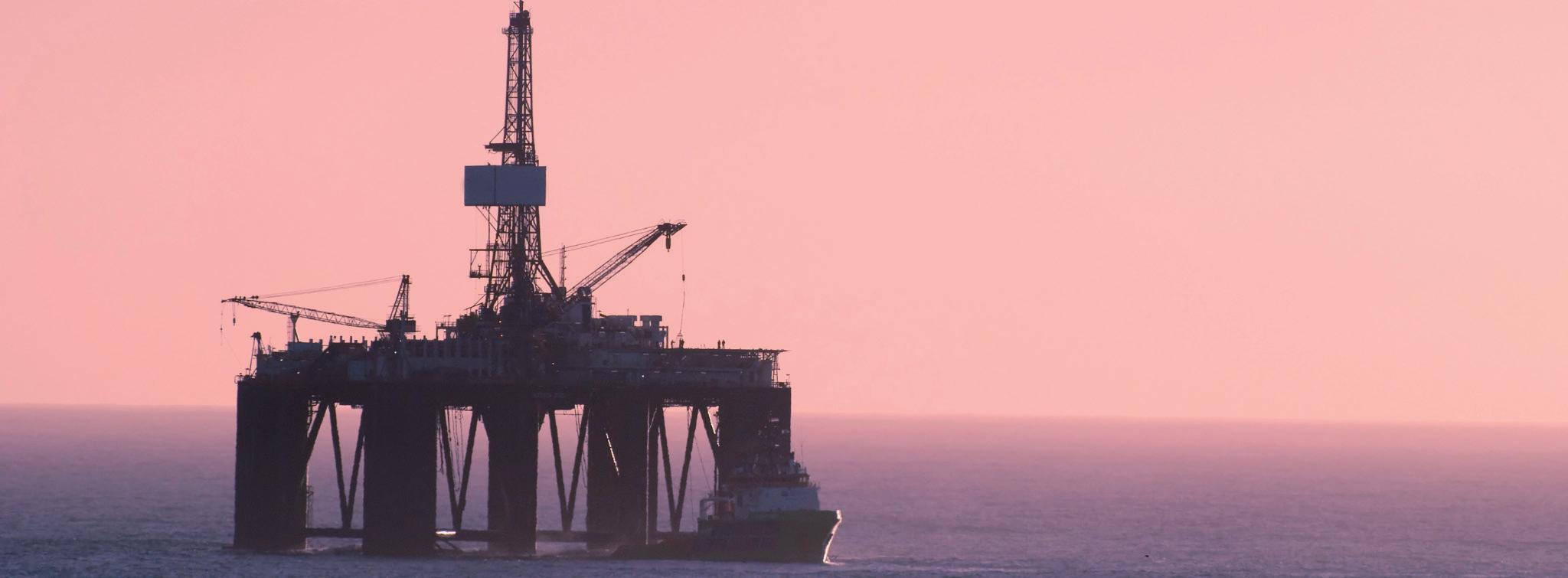
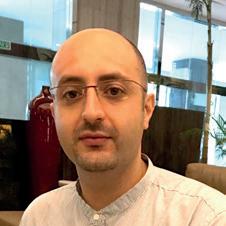
subsidiaries, or improving its stock range. Regarding the latter, the company keeps high stock levels of common items such as valves, flanges, gaskets, bolts and nuts.
Another key strategy adopted, this time in 2017, was to pivot to a more consultative offering. Here, Arrow has positioned itself as a go-to for solving customer problems with no obligations on the part of client to commit to any product orders. In doing so, the company has been able to acquire important business information, at the same time bringing new products and fresh approaches to challenges to its customers’ attention. Further, it has also enabled Arrow to successfully target larger clients with the budgets to keep the company financially viable, including the likes of Petronas and RAPID Pengerang.
The most recent hurdle arrived in 2020 in the form of the Covid pandemic. The inability to travel freely severely hampered day-to-day operations – however, as has been shown through the previous decade, Arrow was able to think on its feet and adapt.
The company used this period to expand outside of Malaysia, leveraging digital communication methods to approach new customers, many of which were now more willing to listen to its proposals. As a result, Arrow has now entered new markets within Asia and Latin America. Meanwhile, following the worst of the pandemic disruption, the firm came back into its local Malaysian market all the stronger by providing greater support and supply experience to local fabricators, EPCC firms, ship repairers and engineering companies.
Today, Arrow is on a firm financial and reputational footing. The past two years have seen steady performance, with revenue growing to US$2m in 2022. Now, with its feet firmly on the ground and value being demonstrated to customers in Malaysia and further afield with every passing week, the future looks decidedly more certain than when the company started knocking on doors.
Arrow has about 20 years of experience of producing different type of flanges. The company’s products have been exported to the Middle East and Southeast Asia successfully. Arrow is equipped with the most modern facilities and a highly qualified workforce, enabling the offering of the widest possible range of flanges. Arrow’s product line embodies the highest standards in quality, productivity and dependability.
Story type
#resilience (main category)
#collaboration
Benefits
• Revenue of US$2m in 2022.
• Arrow entered new markets in Asia and Latin America.

Key findings
For industry
• Turn rejection into an opportunity to grow your business.
Arrow at a glance:
Key products and services: Supply of customised forging parts.
Main industries served:
• Oil and gas – 60%

• Conventional power – 10%
• Renewables – 10%
• Others (structural industry, palm oil, ship building, ship maintenance) – 20%

Headquarters: Petaling Jaya, Malaysia
Year established: 2012
Number of employees: 8
Revenue from exports: 60%




ARUP is drawing on all its experience in supporting solar farm developments and operating in awkward terrains to help the Philippines on its much-needed energy transition journey. Faced with a grid unable to provide a stable power supply during the pandemic, the government has ramped up its efforts to facilitate more renewable energy developments, with solar plants identified as a critical component of its energy security strategy. To make the most of the opportunity, projects need to be delivered on challenging parcels of land, especially mountainous terrains that are in abundant supply across the country. Here, ARUP has risen to the challenge, supporting a client in what is a first of its kind solar plant development in the country.
As well as presenting major health and economic challenges, the covid pandemic highlighted the fragility of the Philippines’ energy security. Power outages became rampant and regular as the national grid was not able to provide consistent service to the whole population, this prompting the government to accelerate projects on renewables.
For ARUP, a UK-headquartered firm of designers, planners, engineers, consultants and technical specialists, that has been present in the Philippines since 1990, this prompted the need to project itself as the go-to expert in infrastructure works in the country. With vast experience working on renewables projects around the world, ARUP’s mission is to shape a better world by being what it terms a ‘critical friend’ for clients – a go-to organisation that can help resolve complex issues.
This was put to the test when a client asked for support on developing a utility scale solar PV plant on an undulating hillside terrain.
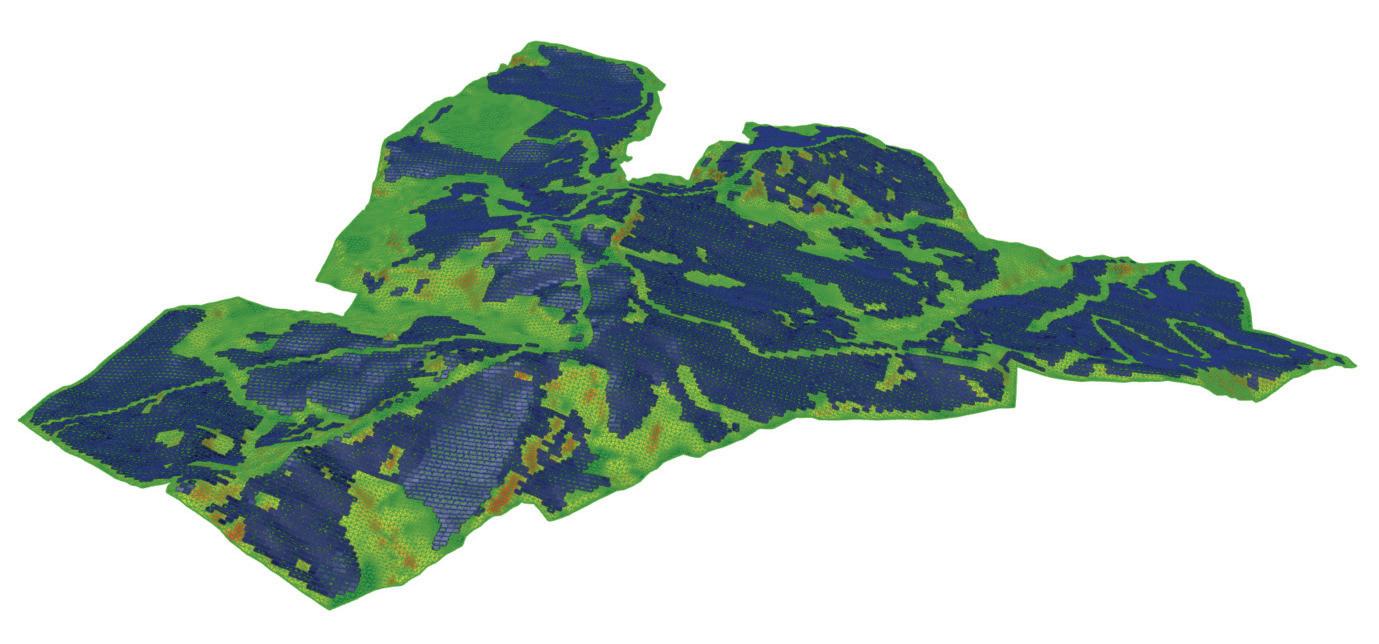

Hillside solar farms represent an increasingly popular alternative to taking up large, flat swathes of land – they increase the usability of awkward terrain, provide clean renewable energy to the grid and improve employment opportunities for local communities.
In this instance, ARUP was working with a contractor that had never developed a solar power plant, much less on a hillside, the project also being the first of its kind in the Philippines. The company also lacked the exact experience, but it was able to draw on the lessons it learned from developing complex projects on very similar kinds of terrain and its extensive solar design knowledge to make it work – indeed, ARUP has garnered a reputation for mastering complex projects, and applied the same process of critical thinking and creativity to this development.
First, it had to identify the risks and challenges of the
project site, a key task being to find safe, stable and accessible ground, as well as optimal places to position panels to maximise solar yield. Here, the company applied its familiarity with the local climate and site conditions to identify probable risks to the project for the long term, mapping the constraints of the terrain and setting a safe clearance for development.
To expedite best panel positioning in consideration of best sun capture, it developed its own automated tool to generate the optimal layout of the plant, saving it around a third of the time compared with completing the process manually and helping ARUP to secure two more sites of similar complexity. The automated layout keeps track of all individual panel data, creating a mine of information that underpins crucial decision making and enables maximum performance to be derived.
The credentials of ARUP’s approach were tested on numerous occasions by the elements. For example, two typhoons were encountered during the construction phase which challenged the design of the plant regarding wind direction and uplift force. The mounting structure foundation design held up to scrutiny, granting the client confidence that the plant could withstand severe climatic conditions.
Projects like this will serve ARUP well in the future. As its track record for supporting hillside solar developments in the Philippines continues to strengthen, it looks well placed to play an important role in building up the renewable energy capacity the county badly needs to ensure its energy security.
Dedicated to sustainable development, ARUP is a collection of designers, consultants and experts working globally with more than 40 offices in seven continents. Founded to be both humane and excellent, ARUP collaborates with clients and partners using imagination, technology and rigour to shape a better world.
Story type
#service & solutions (main category)
#optimisation, #sustainability
Benefits
• ARUP becoming a leader in supporting the hillside solar energy market in the Philippines.
• Client’s first solar project in the country successfully developed.
Key findings
For industry
• Challenges are part of any project or business, one must know their limits and leverage on the skills and capabilities of their team members to supplement their skills.
• Be updated on current events and know the market so that a holistic view on things can be provided.
For government
• Ease off a few challenges for developers in regard to meeting their construction timelines by streamlining and permitting process.
ARUP Philippines at a glance:
Key products and services: Specialist services on infrastructure, buildings, management consulting, economics and planning.


Main industries served:
• Renewables – 100%
Headquarters: London, UK
Year established: 1990
Number of employees: 200
Revenue: £1.9bn
Revenue from exports: 30%
in service and safety. For France, safe, reliable and efficient service needed to be the core of ASCO’s offering.


ASCO is successfully finding inspiration in its people, offering safe, lean, efficient and sustainable end-toend logistics solutions. Having appointed a new CEO, Peter France, in 2018, the company has transformed its prospects through a renewed strategy underpinned by an emphasis on safety, service and sustainability, and a more focussed approach to international growth.


Created in 1967, ASCO has developed an esteemed reputation as a leading logistics and materials management company for the global energy industry. Providing a range of services, ASCO is an established and highly regarded enterprise. The company has been working to expand its operational footprint into its first new international locations since 2013, which has come with challenges around resources, training and local content requirements.
Additionally, operating in a cyclical sector, ASCO experienced particularly highly competitive price market during the last Oil & Gas downturn and a change in management has served to steady the ship, return to growth and set ASCO on a new, more prosperous path.
Since Peter France came on board as CEO in 2018, he pivoted the company’s strategic focus towards excellence
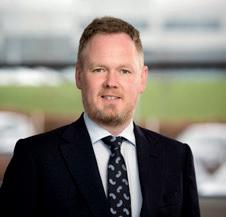
From that point on, the firm no longer aimed to differentiate based on price but on service. By doing a much better job, ASCO would get a better return through better client relationships. Sustainability also became a core focus under France from the end of 2019 onwards, not just from an environmental perspective, but equally looking at raising the longer-term value of the business. Overall business performance was improving, underpinned by a culture of respect and equality. However, some early speed bumps were encountered.
ASCO faced a difficult situation when the covid pandemic arrived, the firm erring on the side of caution in opting to request that higher paid staff take a temporary pay cut. This helped limit the number of long-term headcount reductions to less than 10% of global staff. These difficult decisions ultimately paid dividends, with 2020 turning out not to be as gloomy as originally foreseen and subsequent years returning to sustainable growth and the recruitment of additional heads.
More recently, the war in Ukraine has also pushed the company to be more reactive. Where ASCO had previously been looking at diversifying away from oil and gas, it is now anticipated to continue to be the majority of ASCO’s business for at least the next decade, with oil and gas continuing to offer business opportunities in a tough market.
Beyond these reactive responses, perhaps the most significant change for ASCO in the past half decade has been its approach to international growth. Prior to 2018, the company had taken what can only be described as a scattergun approach to international markets, reacting to any inquiry, no matter where it originated from.
From 2018 onwards, it was decided that a more coherent and planned approach was needed, undertaking country specific due diligence in advance of establishment. Critically, management felt that the firm had the capacity to develop three new overseas opportunities in parallel in order to give them the necessary resource and focus. Resultantly, Suriname, Senegal and Mexico were targeted, and while the latter provided significant difficulty and ultimately did not progress, ASCO became established on the ground in Senegal in 2021 and Suriname in 2022.
In each of these new markets, the idea is to have local people eventually driving each respective regional business. In Senegal, for example, while much of the business is currently driven by expats, the aim is to hand over each role to locals over a two-to-five-year period. To support this, each expat position has a local deputy attached to accelerate knowledge transfer through an understudy process. A team of subject matter experts, expats and HR personnel carefully designed the operating model for the new locations with layouts, workflows and personnel org charts to ensure there was no disruption to ongoing operations in any of ASCO’s locations.
With Senegal and Suriname now established, ASCO is now looking ahead to additional potential locations, the plan being to develop out from existing presence and hubs. Indeed, having become profitable in two of these initial three overseas ventures which mark ASCO’s first new international footprints in almost 10 years, the firm now sees international growth as a profitable, high growth and managed risk avenue.
The change in company culture has also had a huge impact, with employees that have been with ASCO for more than two decades reporting that the atmosphere is much better, more open and inclusive, creating a collaborative, positive and happier place to work.
Company performance has continued to improve owing to these changes. While revenue was down 10% in 2020 vs 2019 due to the pandemic, it rebounded to 2019 levels in 2021, and then expanded in 2022, with this growth anticipated to continue in 2023. While ASCO recognises that there are still improvement opportunities that need to be addressed, good progress has been made that is only likely to gather momentum through the remainder of this year and beyond.
About ASCO
ASCO is a leading logistics and materials management company for the global energy industry. ASCO’s safe, lean, efficient, and sustainable end-to-end solutions include logistics, transport and freight, supply base management, warehousing and storage, materials management, fuel and bulk provision, marine services, training, lifting and assurance, personnel and environmental services.

Story type
#people & competency (main category)
#export
Benefits
• Building long-term capabilities allows economic benefits to be apportioned equitably in the local economy.
• Developing a positive workplace culture ensures the business strategy is successful.
• Providing expat opportunities allows knowledge sharing and process standardisation.


Key findings
For industry
• Have confidence in yourself and your decisions. It’s easy to be swayed off strategy when things get hard.
• Invest in local capability in the markets you operate. Politics and culture issues fare better when managed by someone local.
For government
• Focus on local capability, not local content. Your economy will benefit more.
ASCO at a glance:
Key products and services: Logistics, transport and freight, supply base management, warehousing and storage, materials management, marine services, training, lifting and assurance, personnel and environmental services.
Main industries served:
• Oil and gas – 96%
• Renewables – 4%
Headquarters: Aberdeen, UK
Year established: 1967
Number of employees: 1,500
Revenue: £419m (2021)
Revenue from exports: 25%
with significant focus on operational systems, consultancy management and engineering support for CAPEX and OPEX projects.
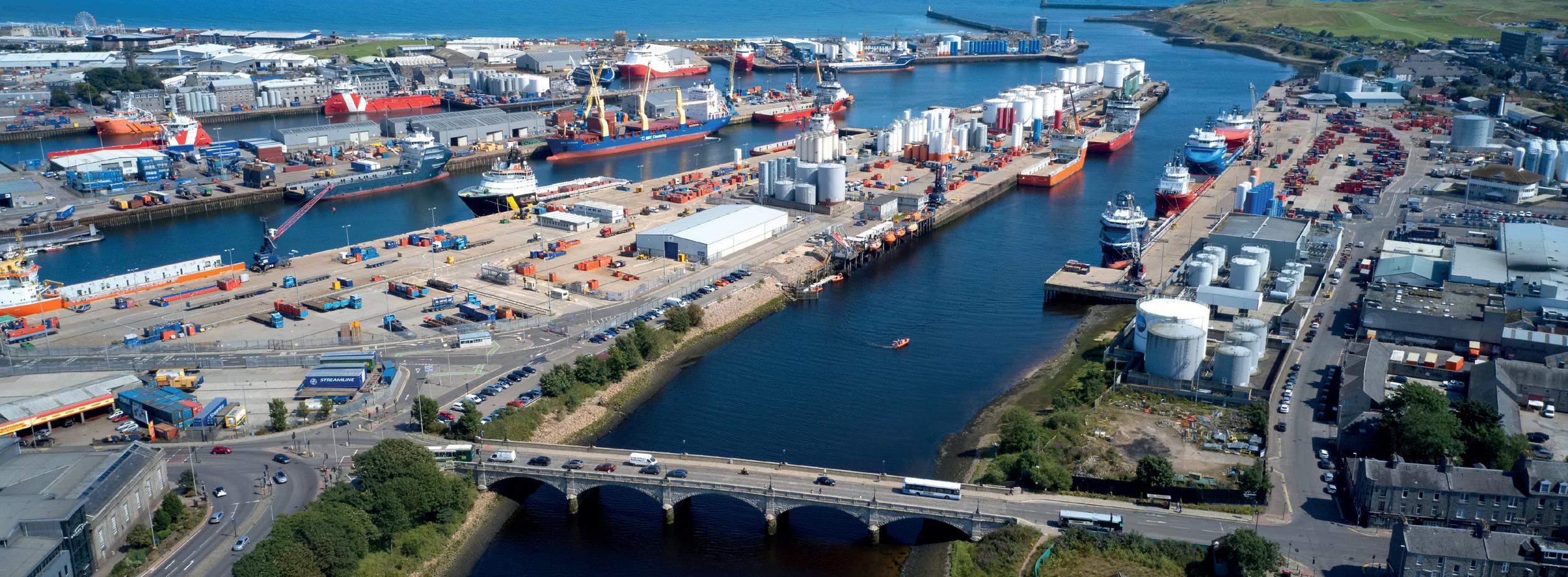


Building up its reputation as a digital solutions specialist in the energy industry, largely thanks to its market leading flange management software Calculate, asset55 has kicked on since 2018, expanding significantly through the introduction of three additional platforms.
With its product portfolio now also comprising of Operate (optimal planning and controlled execution in operation), Execute (optimal planning and controlled execution of capital projects) and Validate (automated validation to secure data integrity), the firm has doubled its users and demonstrated a proven ability to keep on delivering value with these new solutions.
More than 10 years ago, Robert Noble, a pioneer in flange management with torque wrench manufacturer, Hedley Purvis, and Mike Rudd, who was Managing Director, identified an opportunity. With 60 years’ experience between them, the pair saw the industry was on precipice of immense change.
Operators were looking for ways to move away from outdated spreadsheet-based processes and unlock efficiencies by embracing cutting-edge, industry-tailored digital solutions.
To capitalise on this shift, the pair set up asset55 – a software technology engineering company specialising in the development of solutions for the energy sector,
With the help of an experienced team of software development experts, the company launched in late 2012 and after two years of development, in 2014, Calculate was born. A highly successful product, the firm has managed to secure business from three quarters of UK energy operators, with Calculate also established as a flange management software solution of choice.

However, despite the successes of its primary product, the founders knew that they couldn’t afford to sit still and solely rely on one solution alone. Resultantly, the decision was taken to kick on and develop new software solutions to diversify and consolidate its position in the market.
This decision came to fruition in 2018 as asset55 began to expand its portfolio of software platforms from one to four, the firm launching three further key products in the five ensuing years.
Execute was the first of these – a solution specifically designed to optimise planning and controlled execution in operation, launched in 2018. Come 2021, Operate was then added to the collection – a solution designed to optimise operations including shutdown and turnaround projects. And in 2022, Validate was rolled out – a capital project engineering platform with data validation capabilities.
Significant efforts went into developing each of these solutions to ensure they were addressing the unique requirements of the market. To achieve this, asset55 brought in industry subject matter experts and
experienced individuals from operator backgrounds to complement its internal software development team. With this combination, the solutions were successfully developed in house.
While each of these distinct platforms is undoubtedly sophisticated, the firm has faced several challenges regarding its go-to-market strategies and deployment. In the case of Operate, for example, the company faced some resistance from industry players regarding its efforts to change the mindset of shutdowns and turnarounds and optimise processes by reducing helicopter flights, manpower requirements offshore, and more. In such instances, it has had to be innovative, adapting its marketing techniques to specifically target those willing to embrace innovative solutions.
Despite some kickback, the immense value of the firm’s portfolio has been demonstrated by massive increases in uptake. While it had already achieved 10,000 annual users five years ago, this has now doubled to more than 20,000, with the firm’s annual licence renewal rate also reaching 95% despite ongoing economic difficulties. Within this, the firm is now also serving 30 operators – up from eight in 2018.
Indeed, asset55’s solutions have proven their worth among its client base which has benefitted significantly through the adoption of Calculate, Execute, Operate and Validate. In the case of Execute, for example, one client has saved more than US$2m simply by optimising its installation and fabrication sequence.
Despite being a company just 11 years in the making, momentum continues to gather at pace at asset55. And with an impressive, proven ability to deliver efficiency, productivity, operational and cost benefits to its clients, the company’s reputation and customer base are only likely to continue growing.
At its core, asset55 is a software engineering technology company. It brings together highly experienced industry engineers combined with leading software developers to drive real and positive change within the energy sector. Established in 2012, asset55 has grown organically to become a leading and trusted provider of SaaS technology to the wider energy market whilst maintaining clear objectives to support customers on critical operations. asset55 ensures to go above and beyond expectations on delivery and execution of its services.
Story type
#digital (main category)
#innovation, #optimisation
Benefits
• A single client saved US$2m by using Execute.
• asset55’s users have doubled to more than 20,000 in five years.
Key findings
For industry
• The energy industry, where there are major opportunities in digital, should embrace technology more. Still afraid to take risks.
For government
• Open up boundaries: stop making business harder and instead embrace technology that’s out there to help.
asset55 at a glance:
Key products and services: Software technology engineering company.


Main industries served:
• Oil and gas – 85%
• Energy Transition – 4%
• Renewables – 3%
• Conventional power – 2%
• Nuclear power – 2%
• Others (data centres) – 4%
Headquarters: Sunderland, UK
Year established: 2012
Number of employees: 26
Revenue: £4.5m
Revenue from exports: 50%

